“Please go on,” I say to Momo. Overhead, the sky is a pitch-black canvas punctuated with brilliant lighting flashes and deep, rumbling thunder.
Momo stands still. I pull on the rope like a crazy person, waving my stick in front of him to motivate him to keep going, but Momo doesn’t take another step; on the contrary, Momo has decided to turn around and retreat.
“Are you afraid of the bridge?” I scream as I run after him.
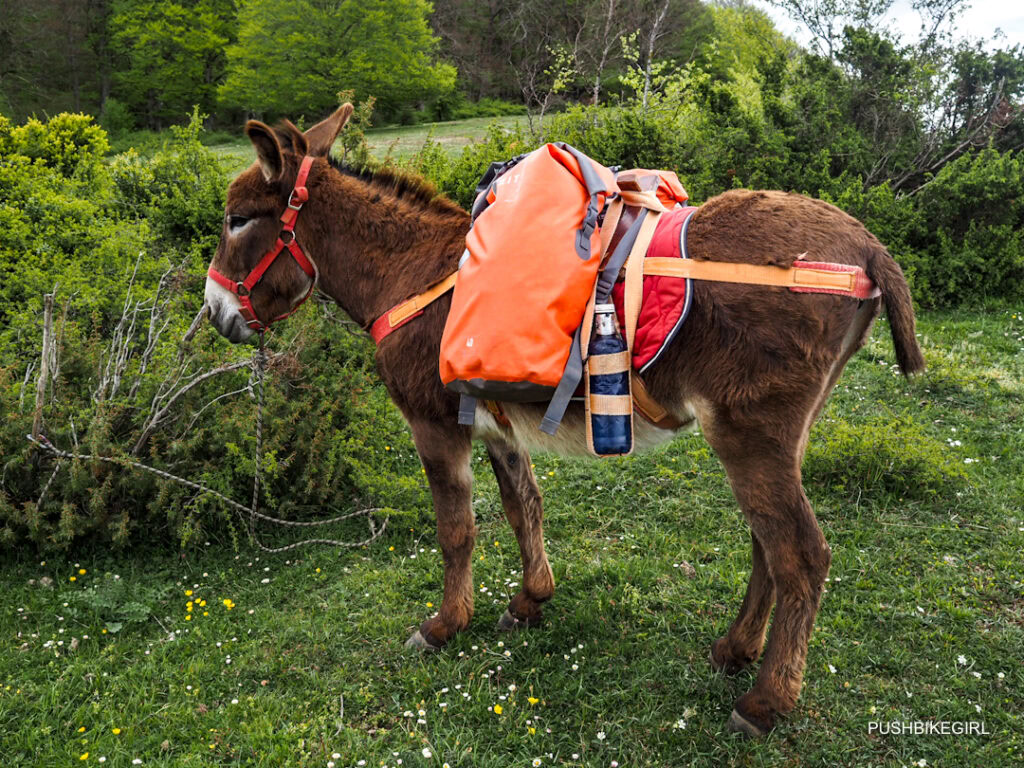
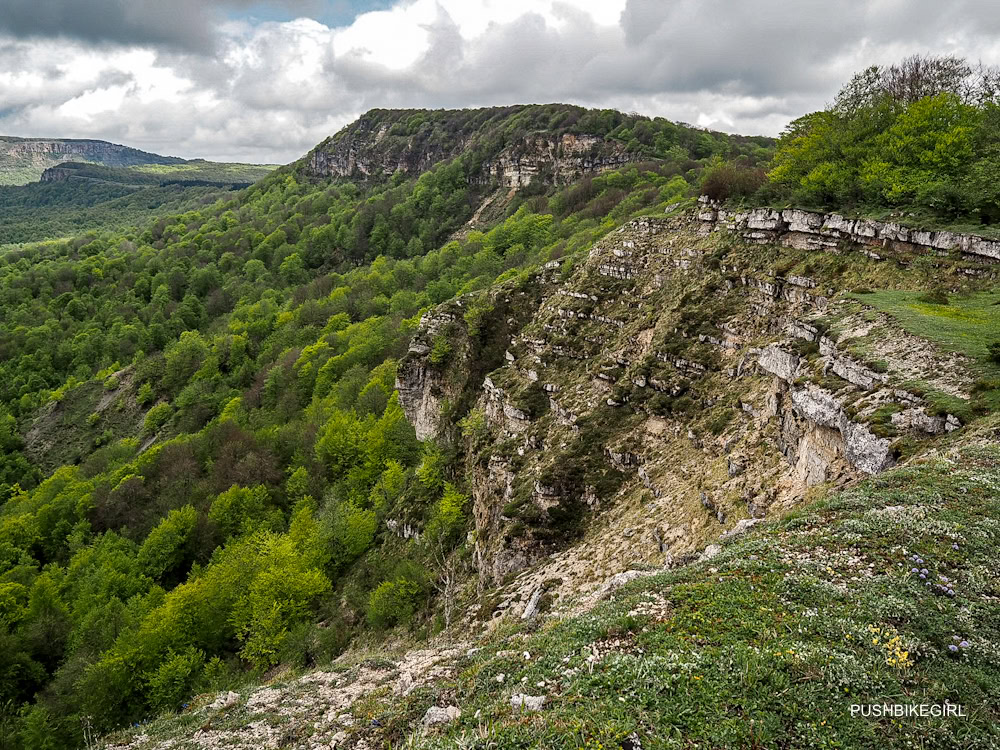
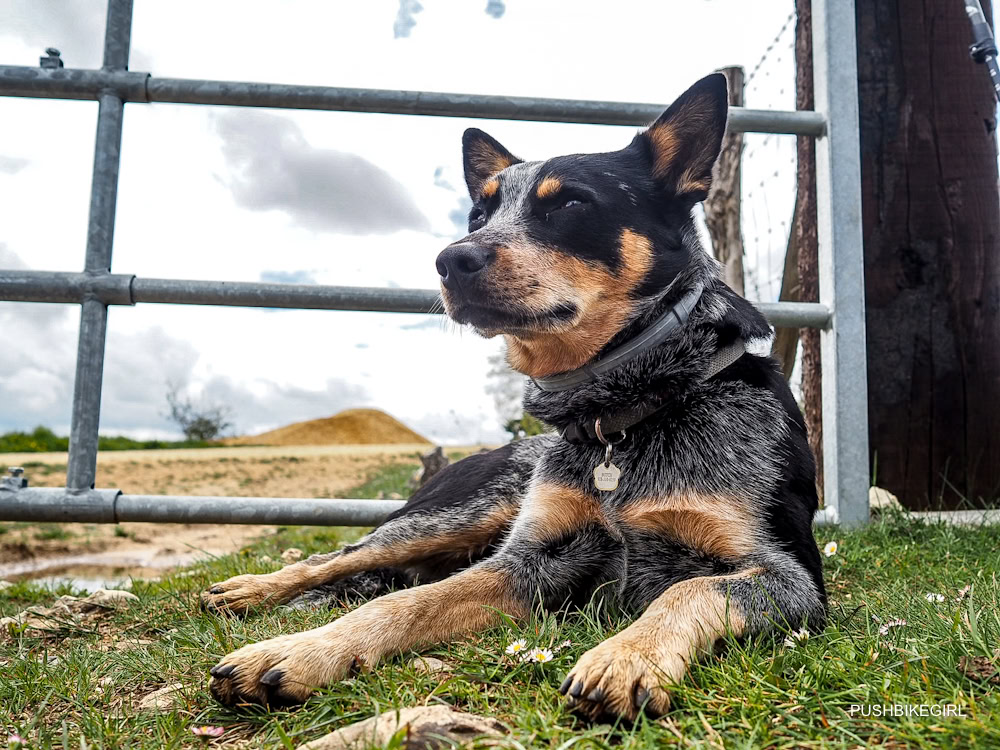
According to the OSM app, there’s a hut less than a kilometer away, which I would have liked to reach before the thunderstorm, but with Django and Momo, we just can’t make any progress.
Okay, I must find a new route; they won’t cross the bridge.
“Butch, let’s go!” and we both look for an alternative route so that we don’t have to walk through the mega mud that we could have avoided with the little wooden bridge.

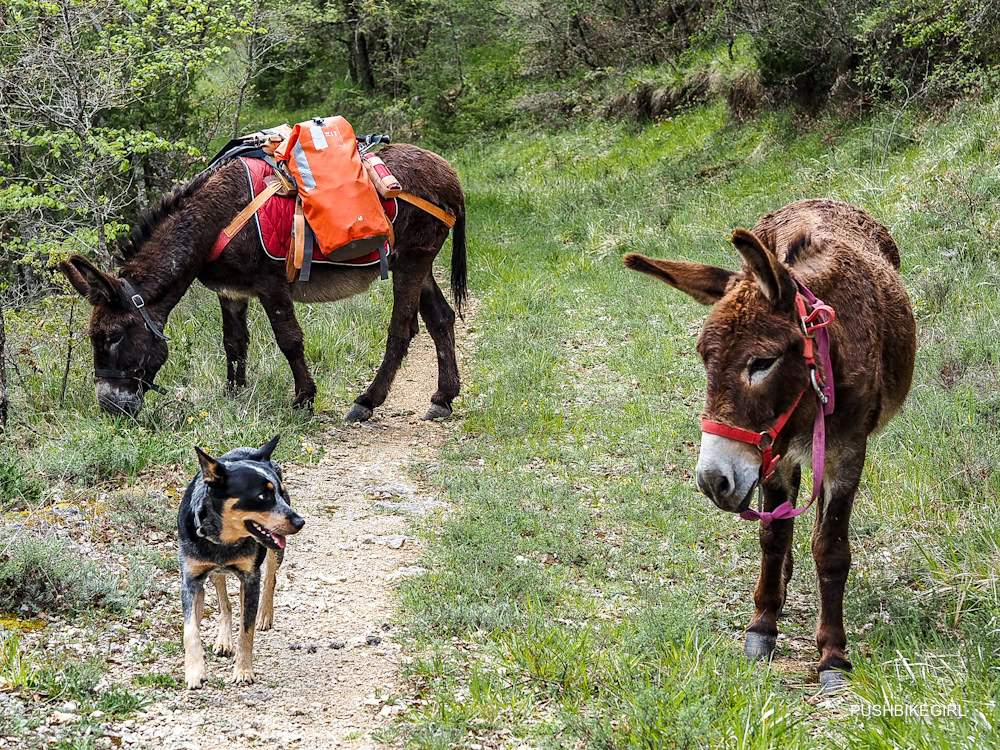
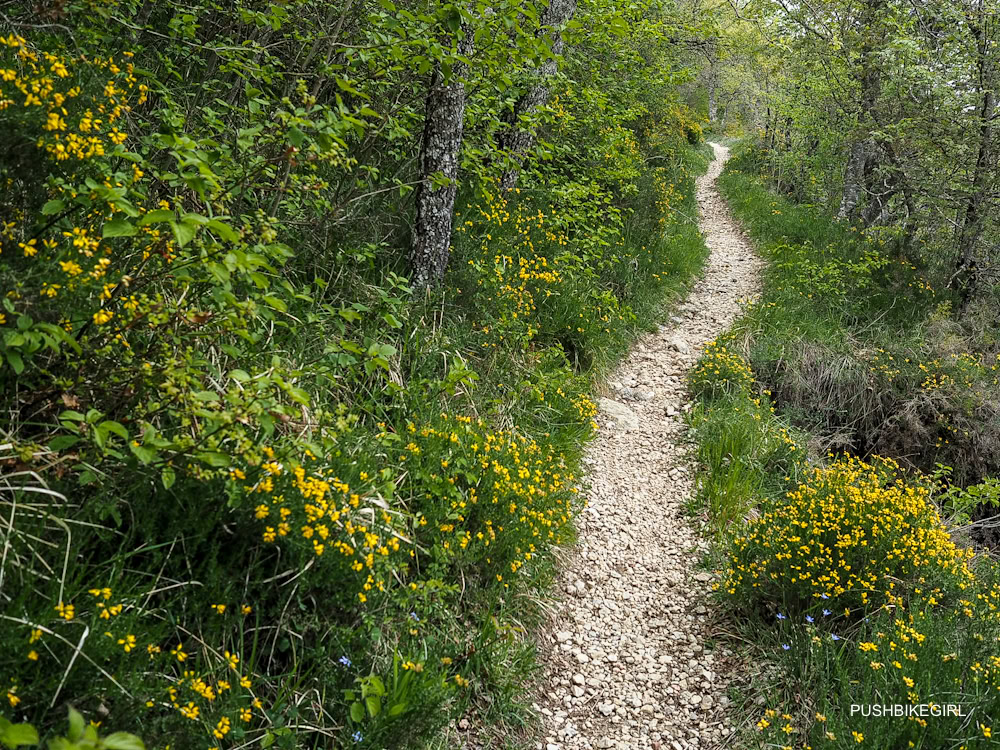
“Oh man, we could have been at the cottage for a long time and waited out the storm in the dry if we didn’t have the donkeys with us,” I grumble, and at that exact moment, it starts to rain. More to the point, it starts bucketing down.
Butch quickly finds an alternative route, which the donkeys seem okay with. So we trot on at donkey speed in the pouring rain.
When we finally arrive at the shelter, to our dismay, we find it locked; mud and dilapidated sheep pens are the only things around. Adding to our misery was the wind roaring up over a nearby precipice from the valley below.
Unfortunately, my rain jacket has been losing its waterproof qualities for years; I curse as the water runs down my back.
Admittedly, I’m a little worried about how we’ll spend the night with the saturated ground.
Typically, I would have just carried on walking, even into the night if necessary, to find a dry shelter, but unfortunately, donkeys don’t know how to move quickly.
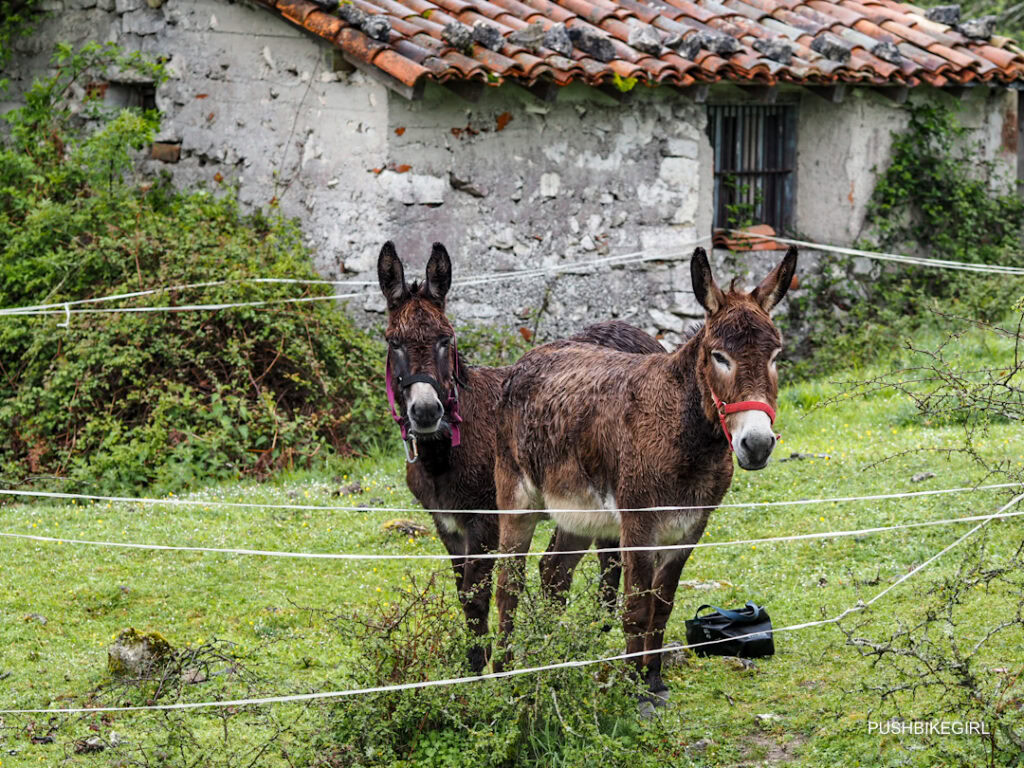
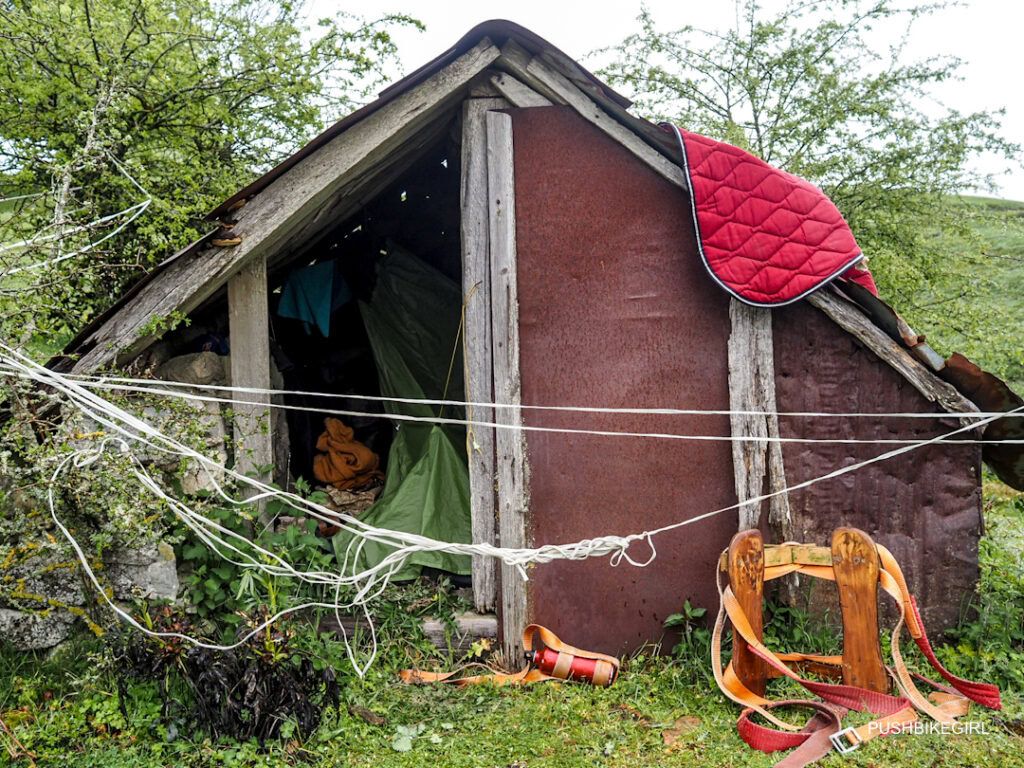
Butch hates the rain as much as I do and seems to be frozen through, while the two donkeys bravely endure the rain and wait patiently to see what happens next.
I realized one thing today on day two: I have to put my needs at the back of the list, and the animals come first.
So I unsaddle, put the luggage in the small hut and fence off an area so Momo and Django can eat during the night.
As I discovered yesterday, creating an overnight coral doesn’t take long. However, there seems to be something wrong today.
Phil, the Scotsman and owner of the donkeys, had warned me emphatically that I shouldn’t get the guy rope tangled, but of course, that’s precisely what happened!
And because it’s so much fun to spend ages unraveling the rope in the pouring rain, I unfortunately have no choice but to do just that now.
It’s great that the donkeys don’t dare touch the taut coral rope, allowing me to sleep peacefully without worrying about them running off.
Then there’s pitching the tent in the tiny hut, which is, unfortunately, a bit of a fiddle with a UL tent without poles and only with a trekking pole, but eventually, that’s done, too.
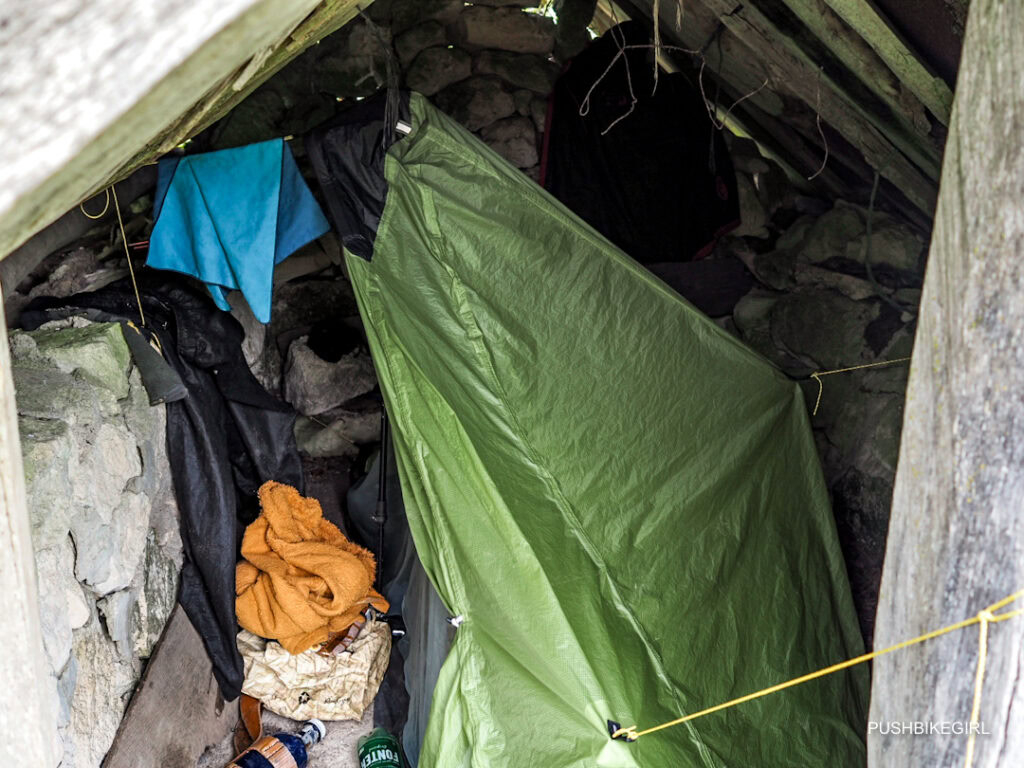
Butch and I are finally in the tent. It’s 10 pm, and it’s been dark for a long time. Butch is frozen to the bone, lying broadside on our mat and warming himself on my legs.
The rain has stopped thundering on the tin roof of the hut. It has finally stopped raining.
Fortunately, the spiders and giant mosquitoes that are at home under the tiny tin roof don’t bother us anymore inside the tent.
I have to admit, even after many years outside, I still find spiders disgusting and am always happy when the mosquito net on the tent keeps me away from the little 8-legged creatures.
I can hear the tinkling of sheep from afar, but maybe it’s horses because, strangely enough, horses also have bells hanging around their necks, albeit larger ones.
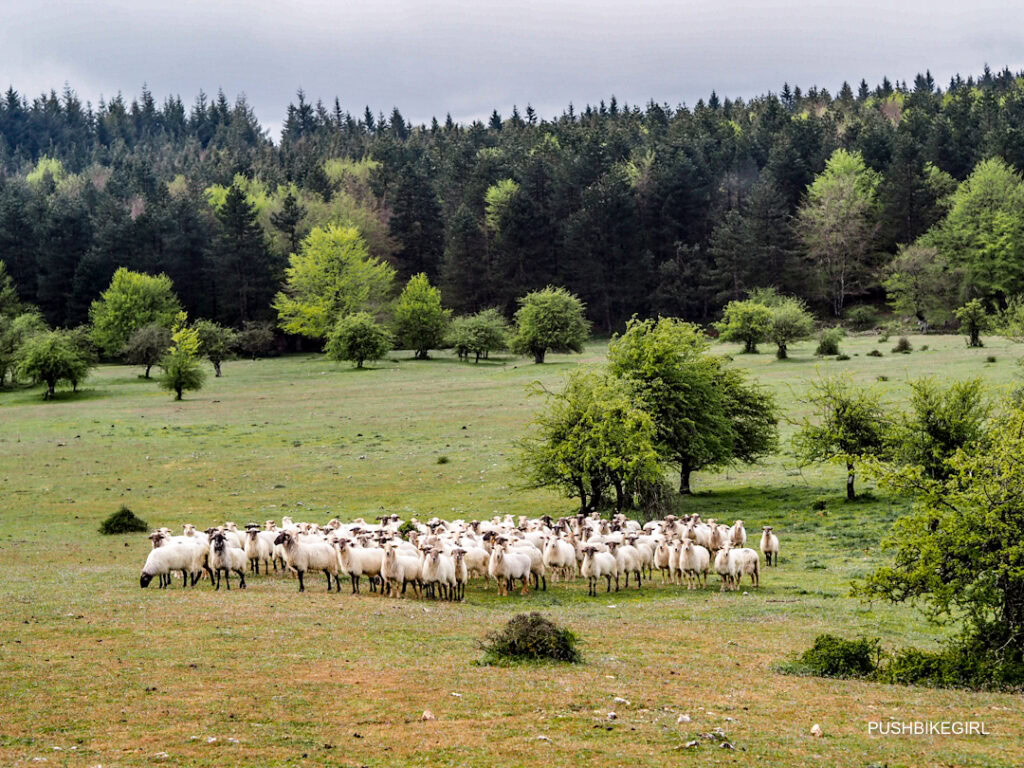
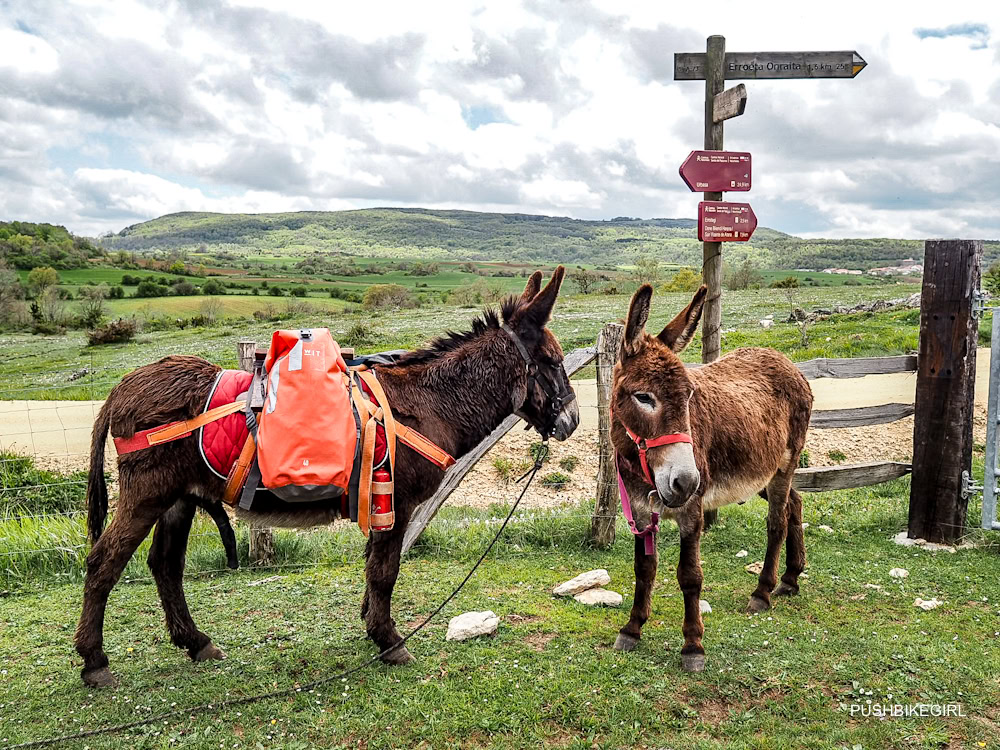
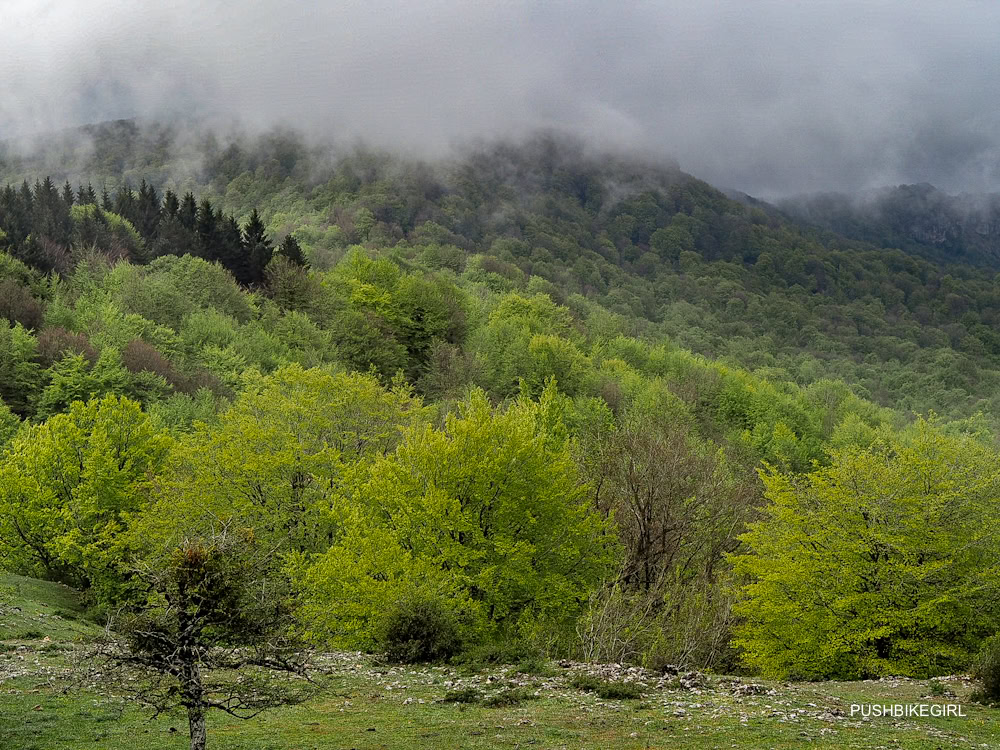
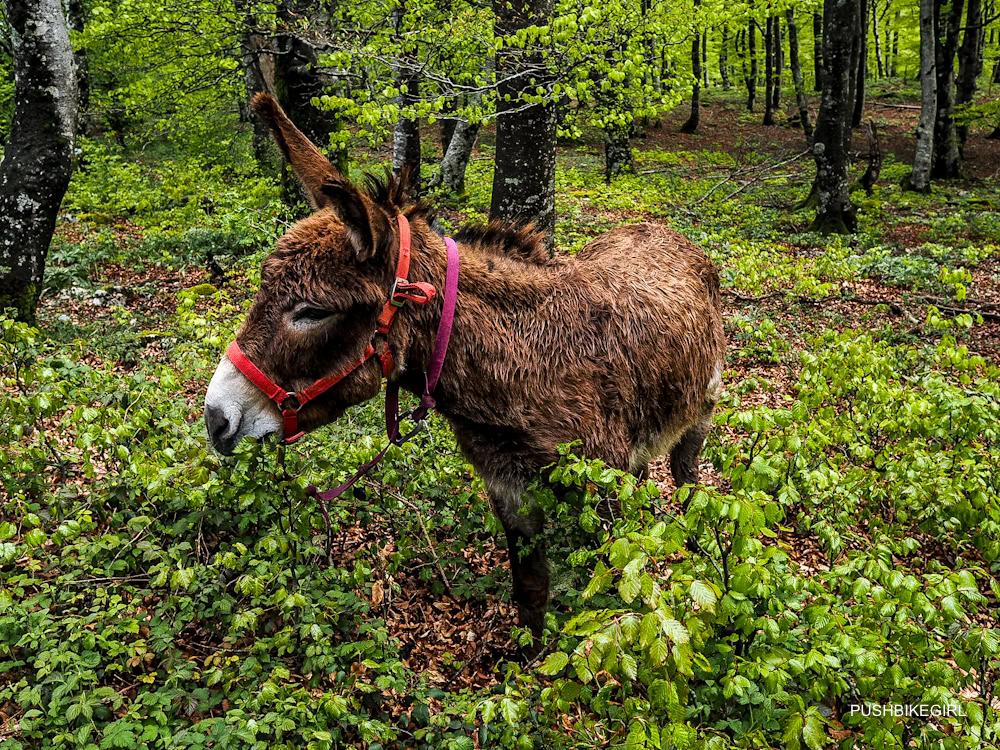
I can hear our two new friends, Momo and Django, plucking grass; otherwise, it is quiet. No engine noise, no people, nothing.
Now I check Butch and myself for ticks and then finally go to sleep.
“I hope the air in the mat lasts longer tonight than it did last night. Sleep well,” and I turn over, tug at the quilt to get some of the blanket from Butch, and try to find some space on the mat.
The fact is, our mat is too narrow for both of us, and the quilt is also too short. As a final thought for the day, I think back to the old days.
The days when I only had a bike and didn’t have to worry about anything else except pedaling.
Almost dull back then, I grin to myself.
Looking back on day two of the donkey hike, I can say what a tough day – when everything started so well yesterday.
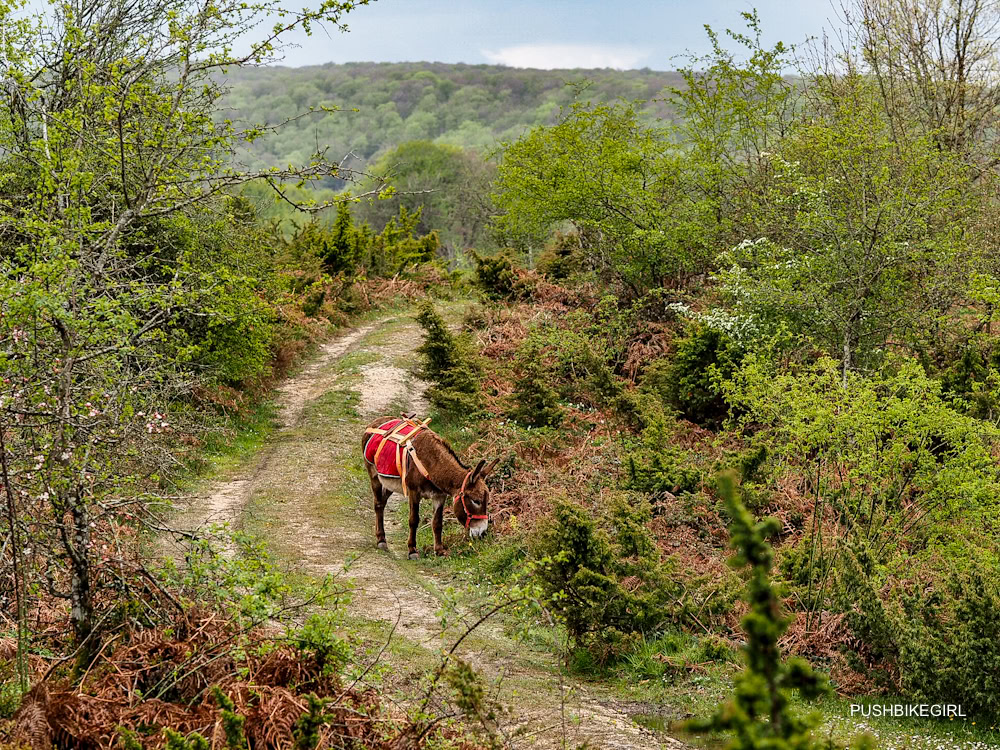
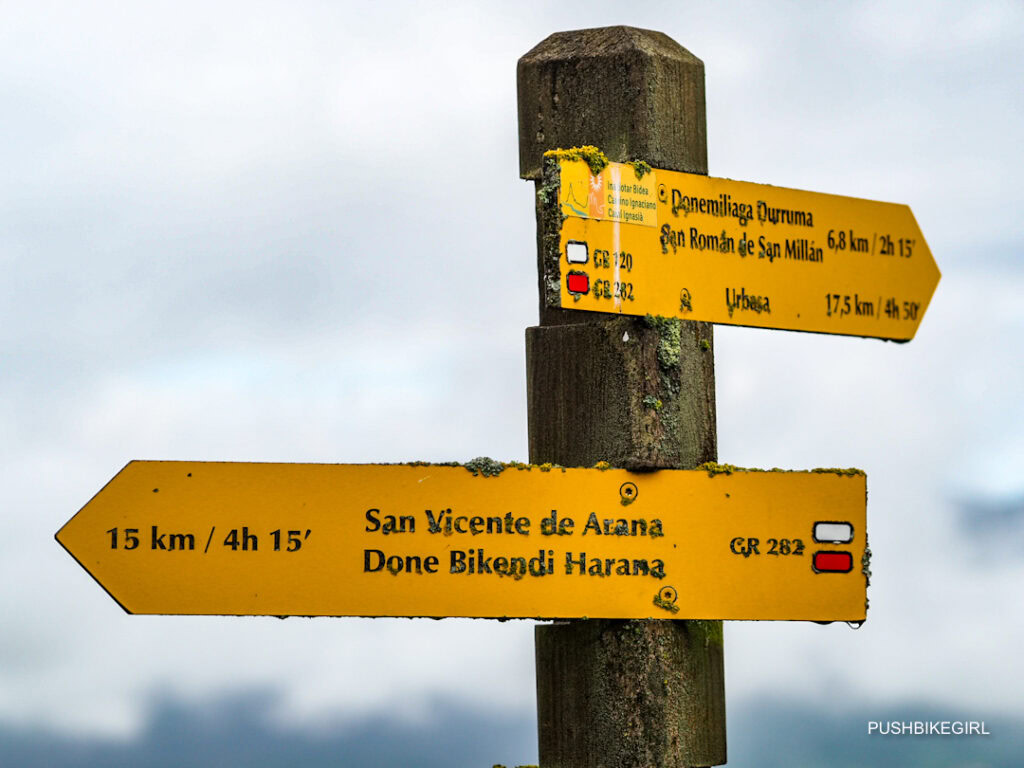
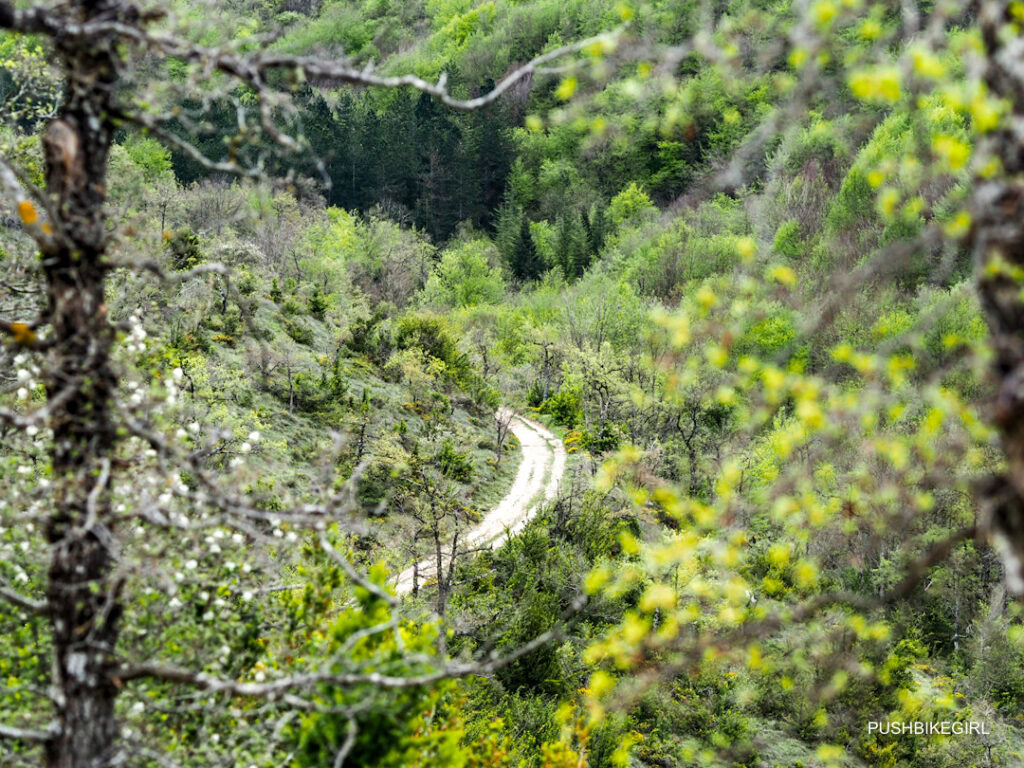
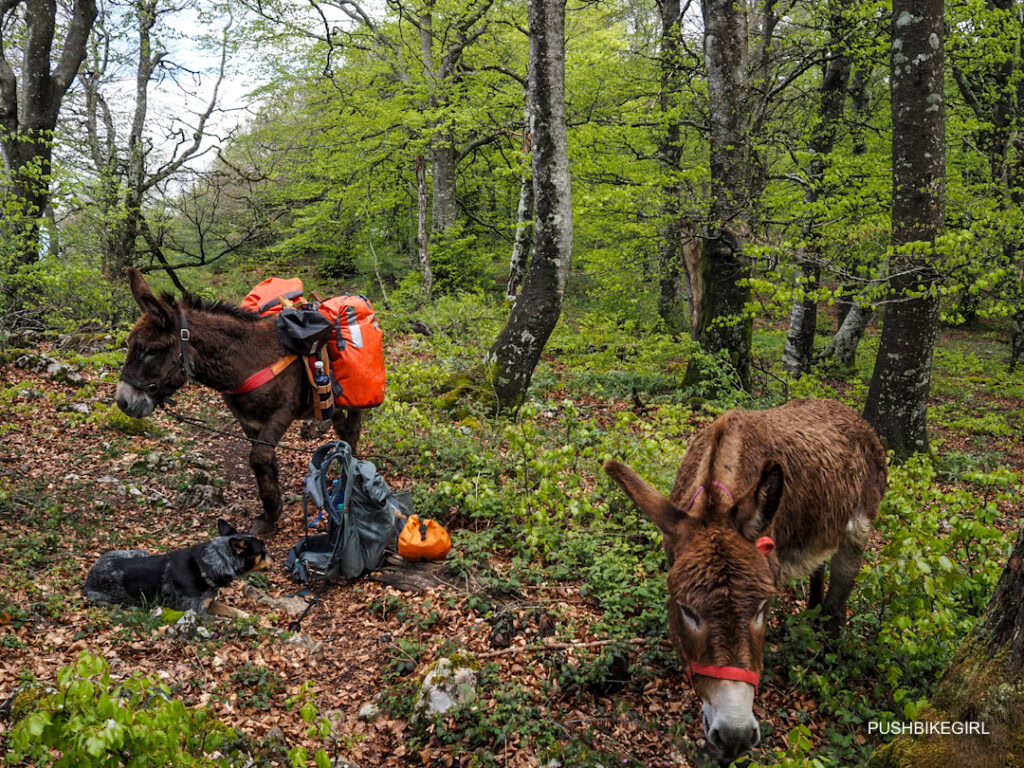
But now let’s start from the beginning.
I’ve dreamed of going on a long journey with donkeys for years. Unfortunately, it has never worked out so far.
Either Corona got in the way, like in Colombia, when I had already found a donkey but was no longer allowed to buy one because of Covid.
Or I found my beloved Butch instead of a donkey on the Baja California in Mexico.
As a woman, they didn’t want to sell me a donkey in the macho country of Chile.
I also had terrible luck with a German woman in Santiago de Chile, where I stayed for two weeks at the horse farm, sleeping in the saddle shed, and ended up sent off with a mule and an ancient saddle, which collapsed after 500 meters. I then turned around, annoyed, and bought a tuk-tuk.
In Spain, it was clear from the start that I wanted to try the donkey again. I simply didn’t know where yet.
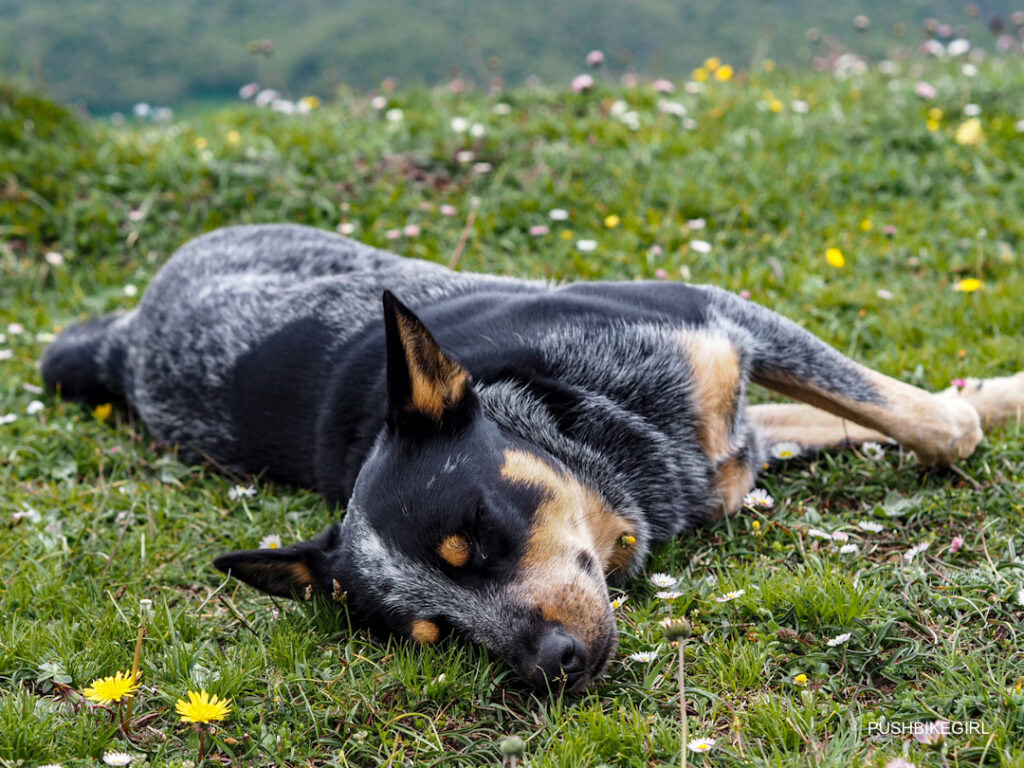
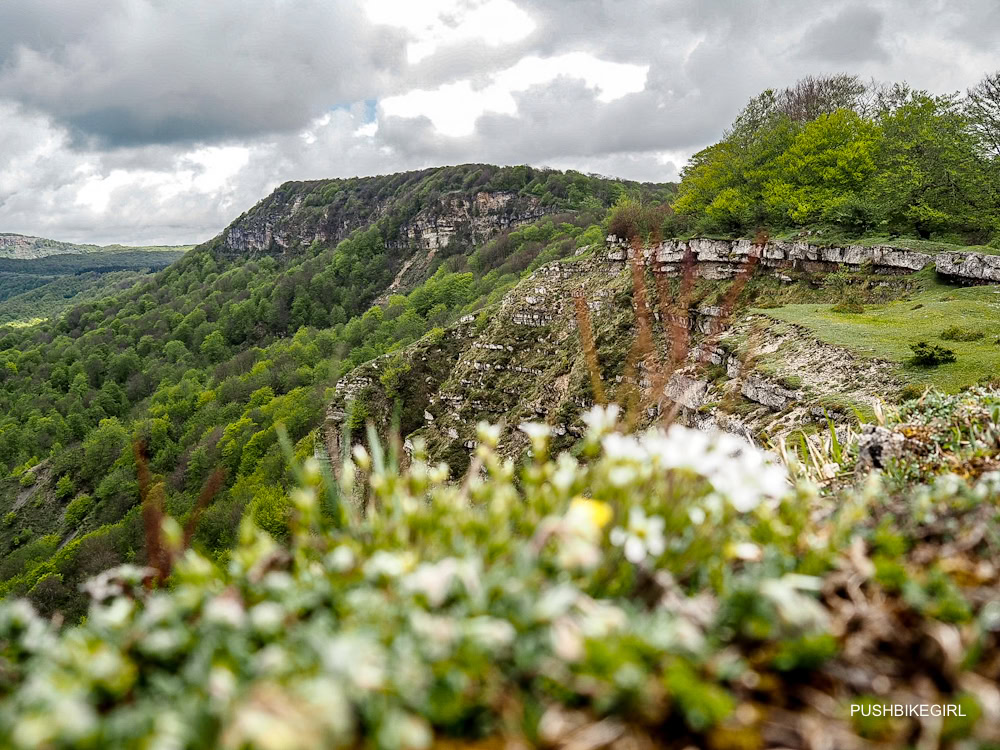
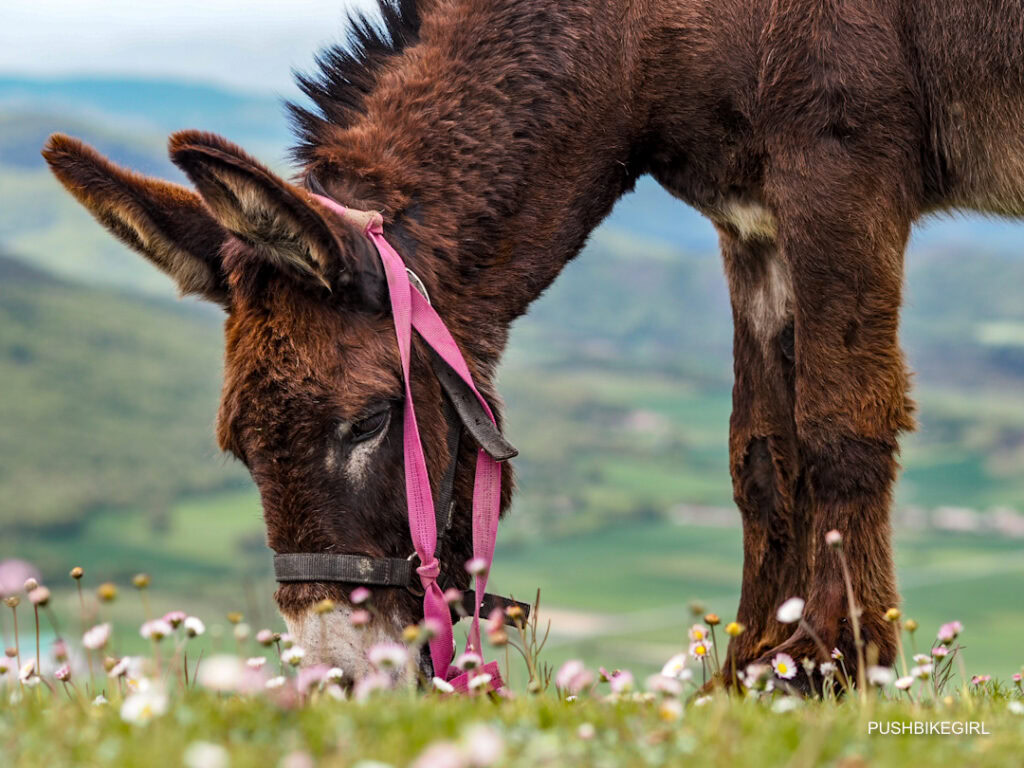
I was thinking of a slow approach, a few test runs somewhere, explanations, and help that someone could give me.
After 800 kilometers, eating only unhealthy food started getting on my nerves because my gear was too heavy, and I couldn’t carry fresh food, so I started surfing the net. I was delighted to discover that there was a donkey trekking provider less than 100 kilometers away.
Phil and his daughter Ishai gave us a warm welcome, but instead of a slow introduction, I was thrown in at the deep end, and Phil just said: “Oh, it’s all pretty easy; you can do it!”
That made Phil likable right from the start.
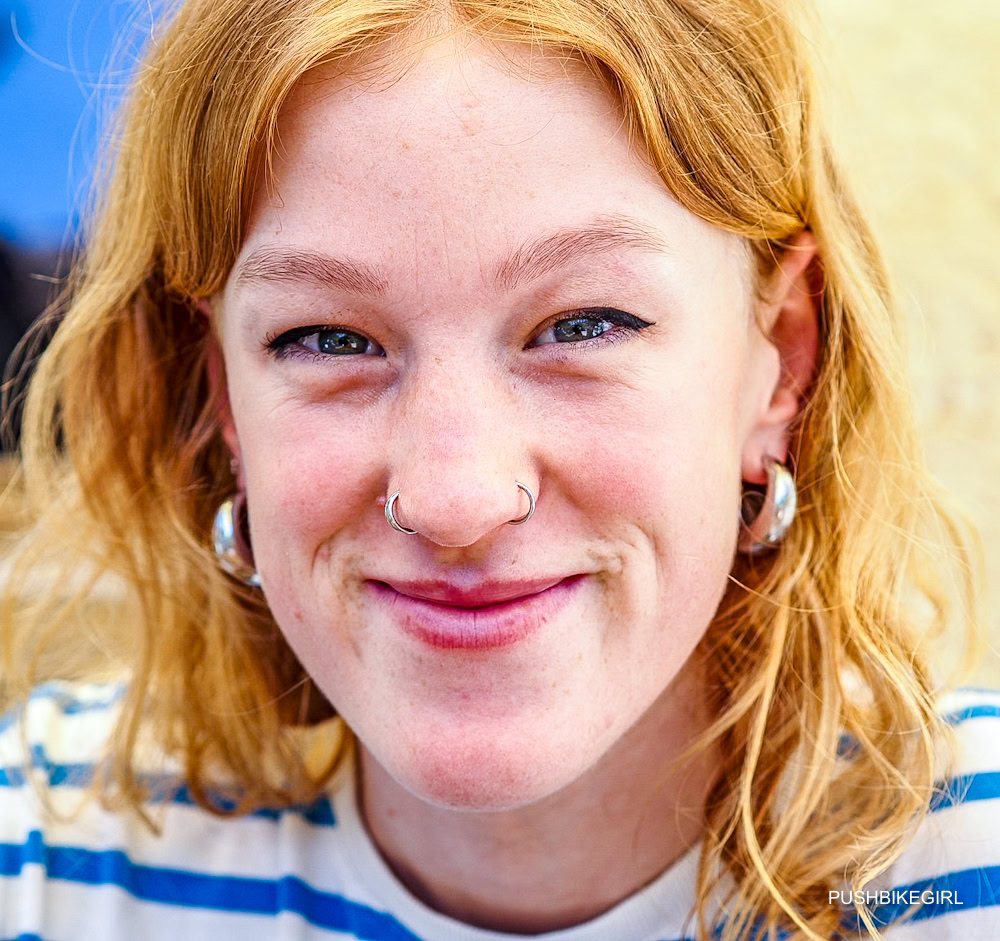
He showed me how to fit the saddle and lead the donkeys and gave me brief instructions on how to enclose a piece of meadow so that the two donkeys have enough space to eat at night but don’t get the idea of running off. And that was all.
On the morning of our first day, all four of his donkeys were out. They ran off and kicked down the gate, and the neighbors let us know that the donkeys had run off again.
After a somewhat lengthy search by car, they were all back where they were supposed to be.
“Oh dear, I hope that doesn’t happen to me,” I said meekly, but for Phil, it seemed to be an everyday occurrence and, therefore, not very exciting.
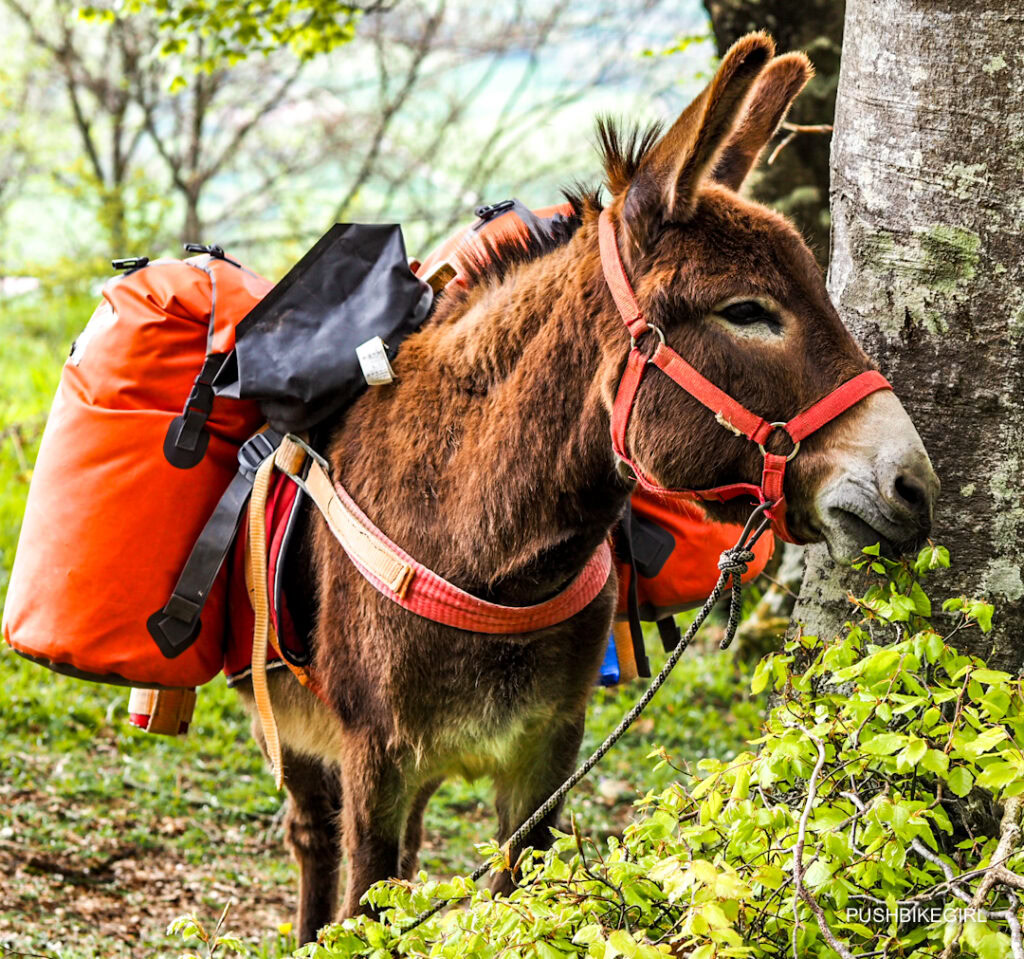
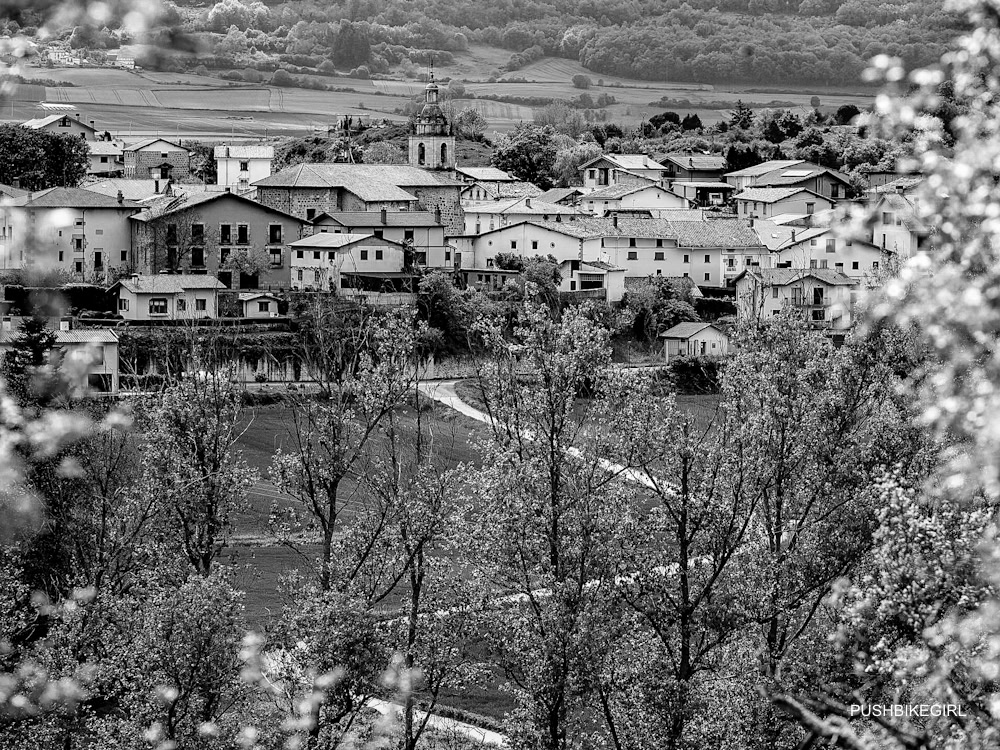
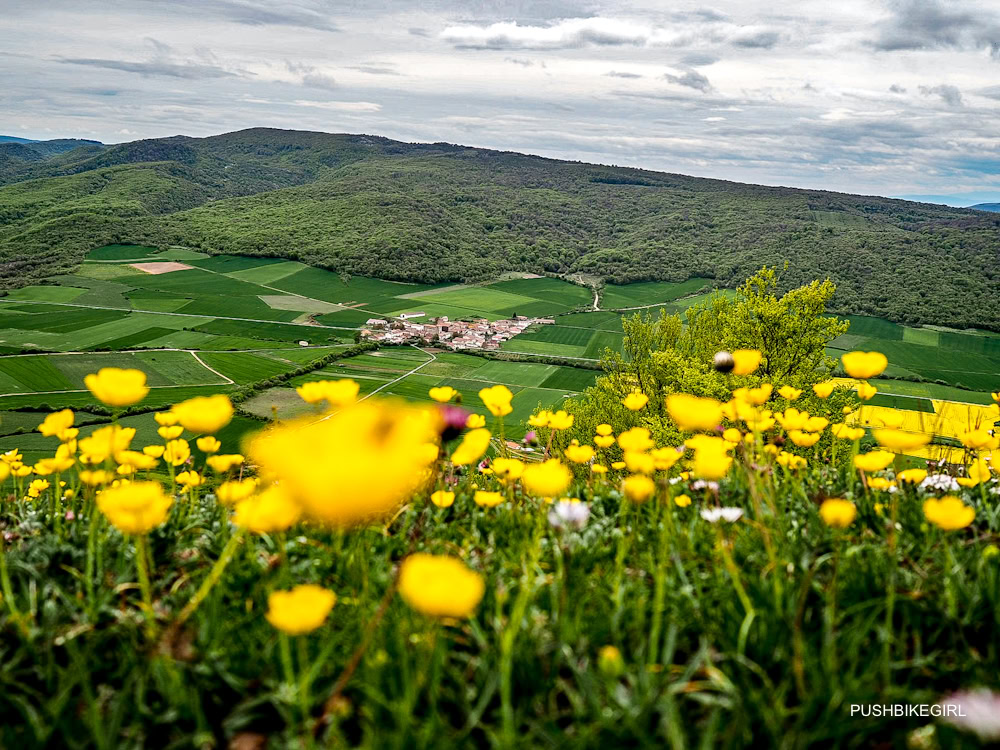
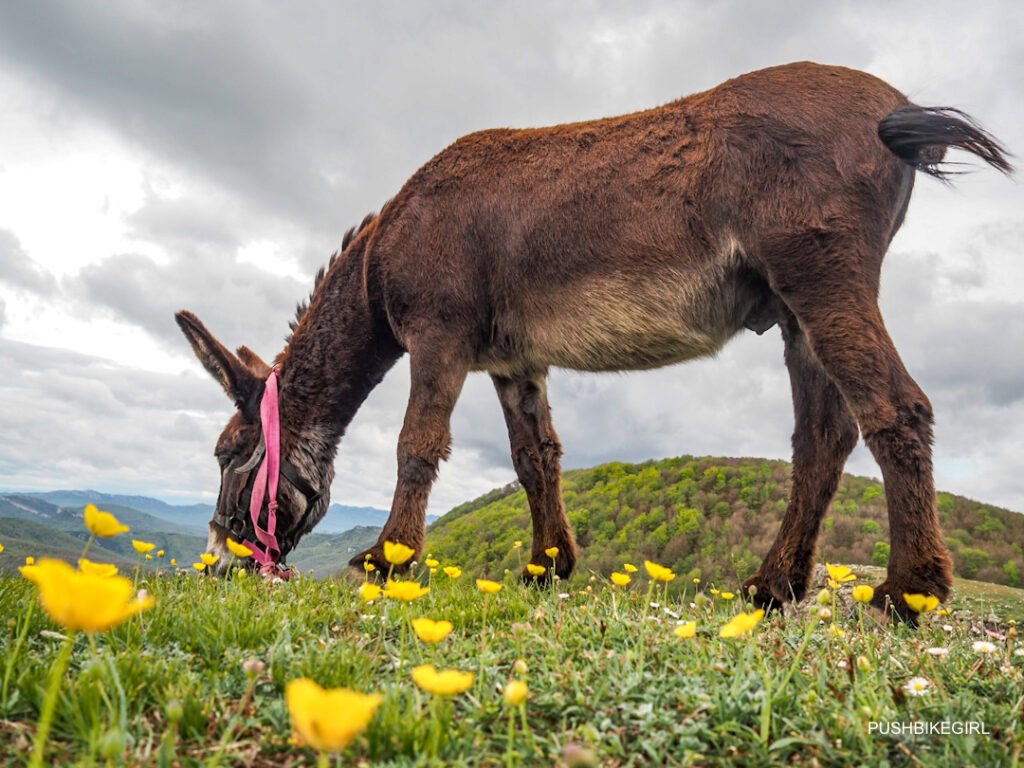
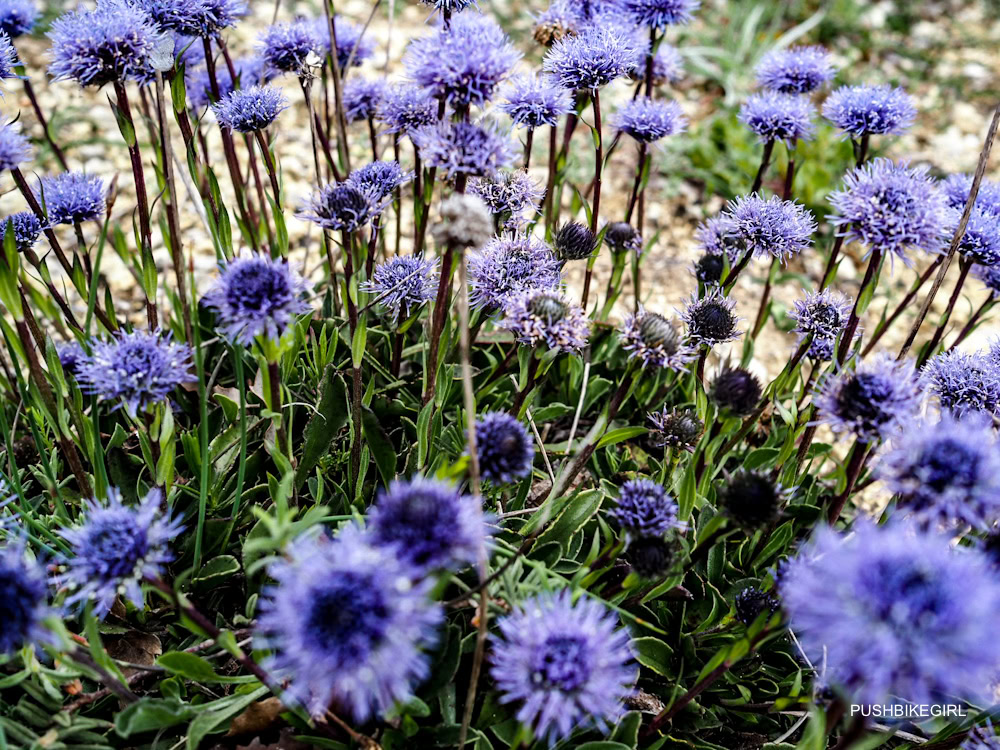
Phil wanted me to go off with all four donkeys, but I didn’t.
“They’ll miss each other then; maybe there’ll be problems?” he said.
“I’m not going on my first donkey hike with four donkeys. No, two at most.”
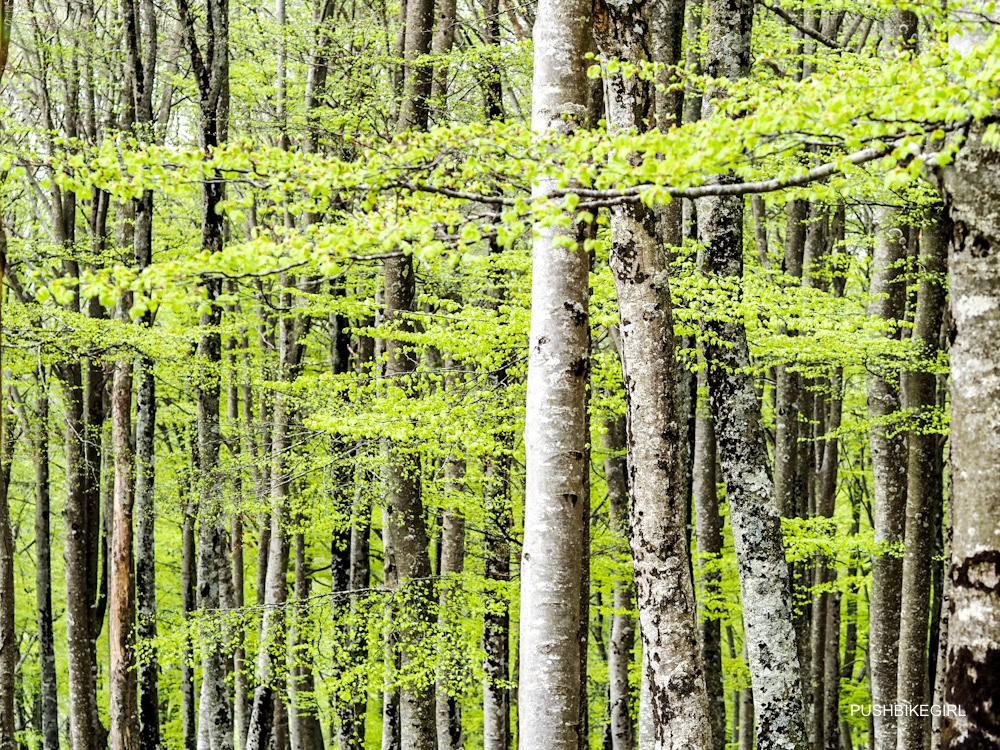
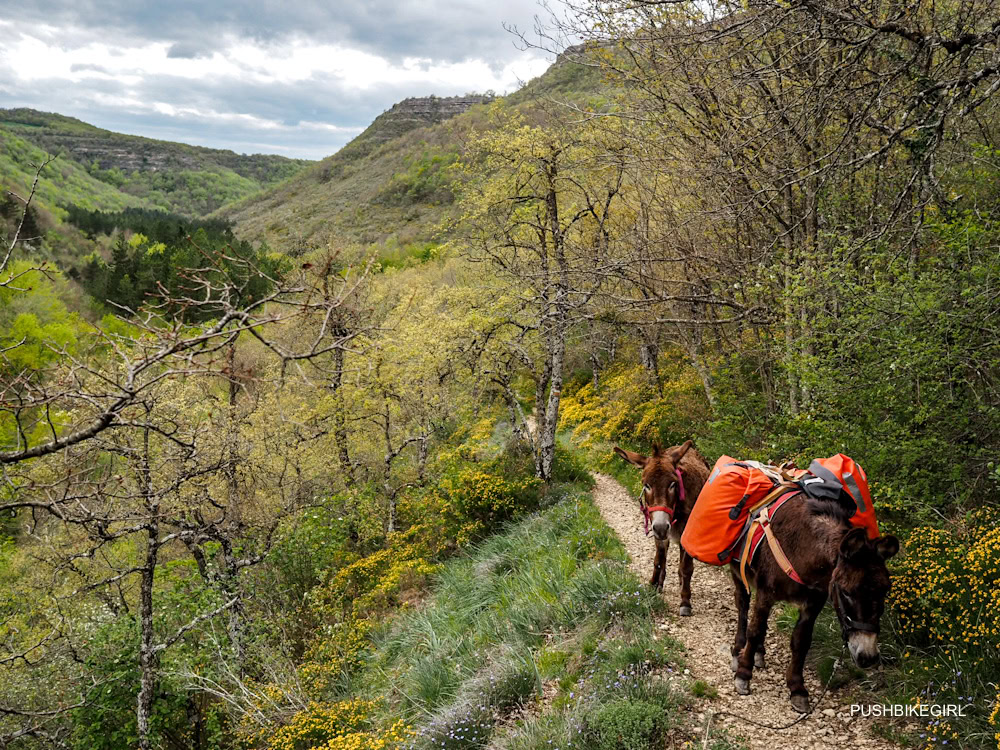
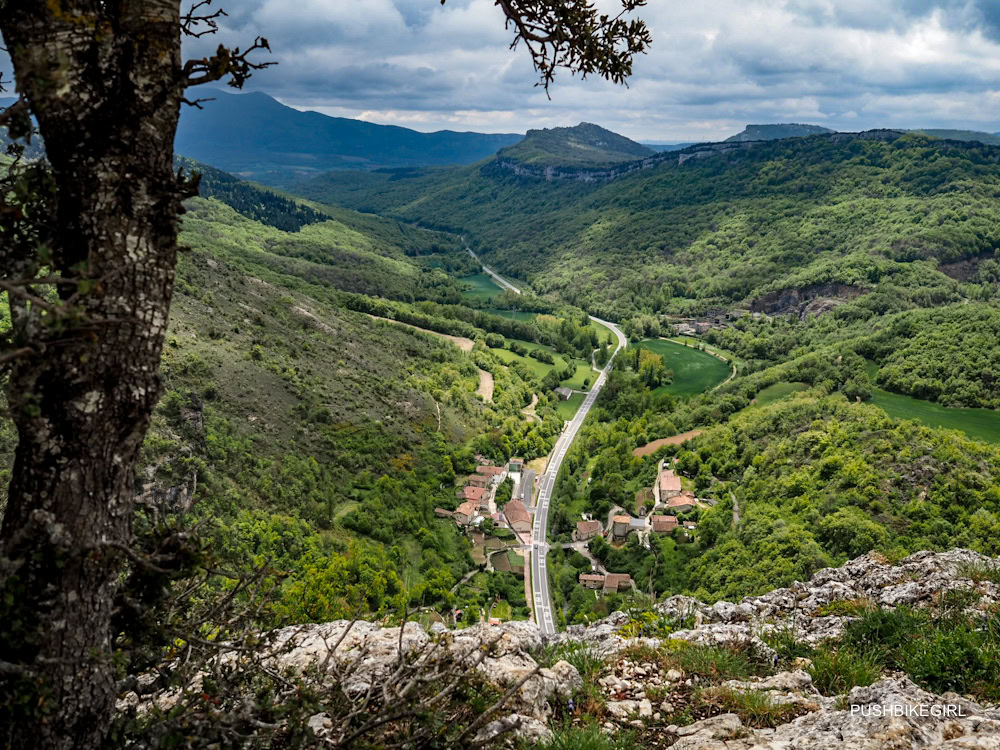
He accompanied us for the first few meters of our planned five-day hike, after which Butch and I were alone with the two donkeys.
Everything goes according to plan; everything feels easy, at least for the first few kilometers.
Phil had recommended a route that we follow at the beginning. It is a beautiful canyon; the flowers bloom, and the views are outstanding.
The lush meadows seem to taste delicious because the two donkeys think eating is pretty cool, so we made little progress.
Butch is always in front, always coming back asking questions – along the lines of: “Are you not making any progress?
No, we’re not making any progress, especially not uphill.
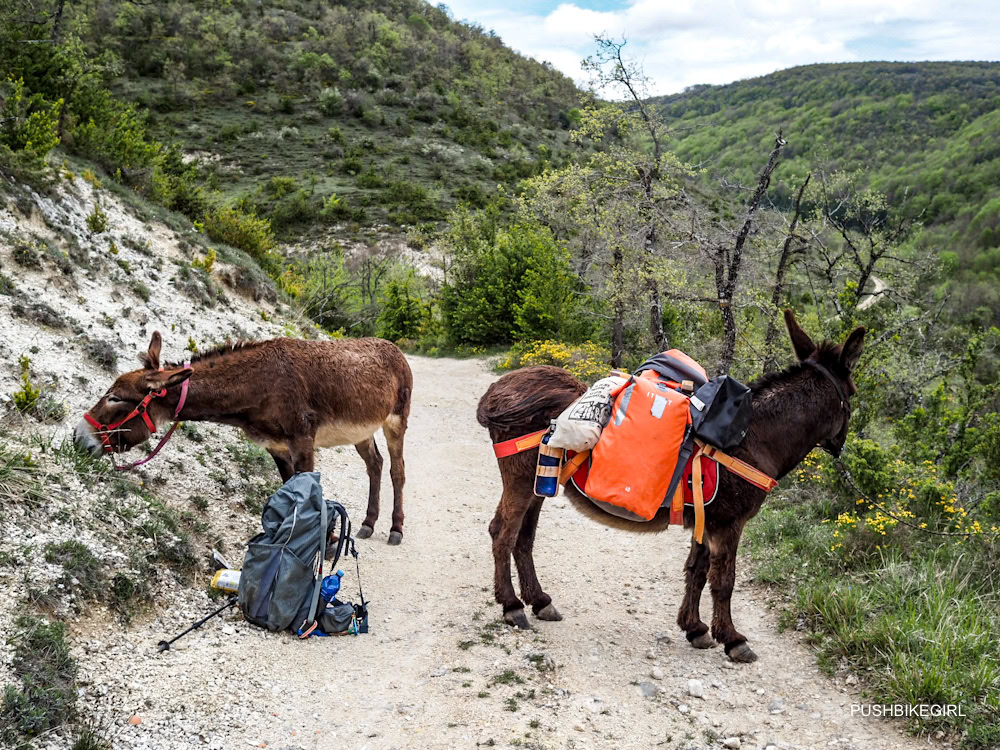
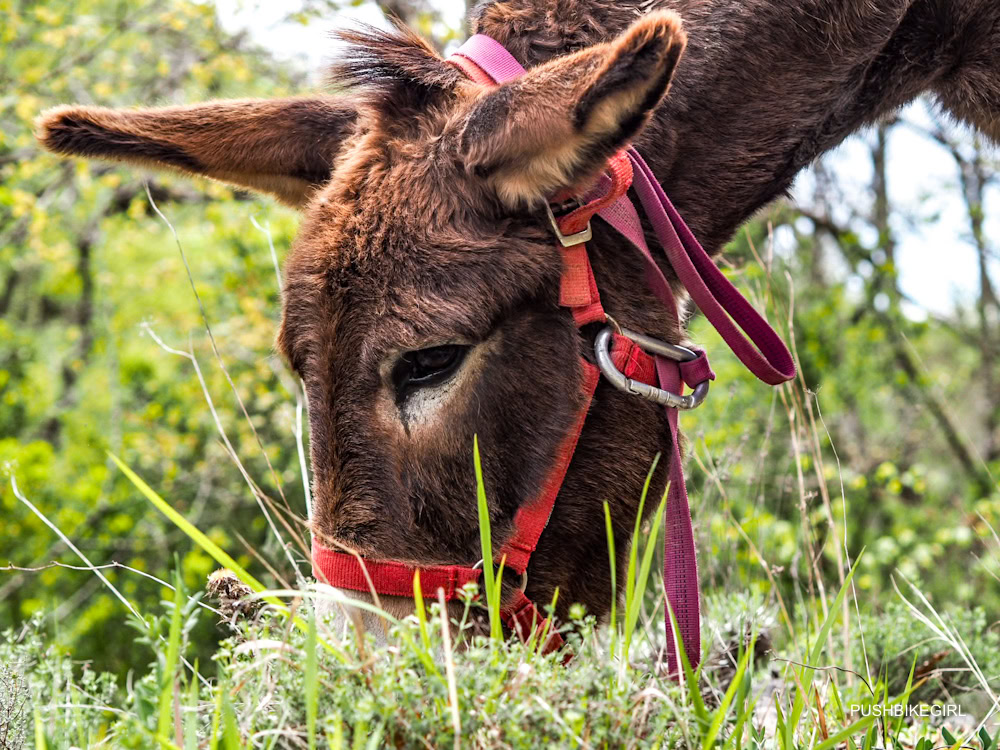
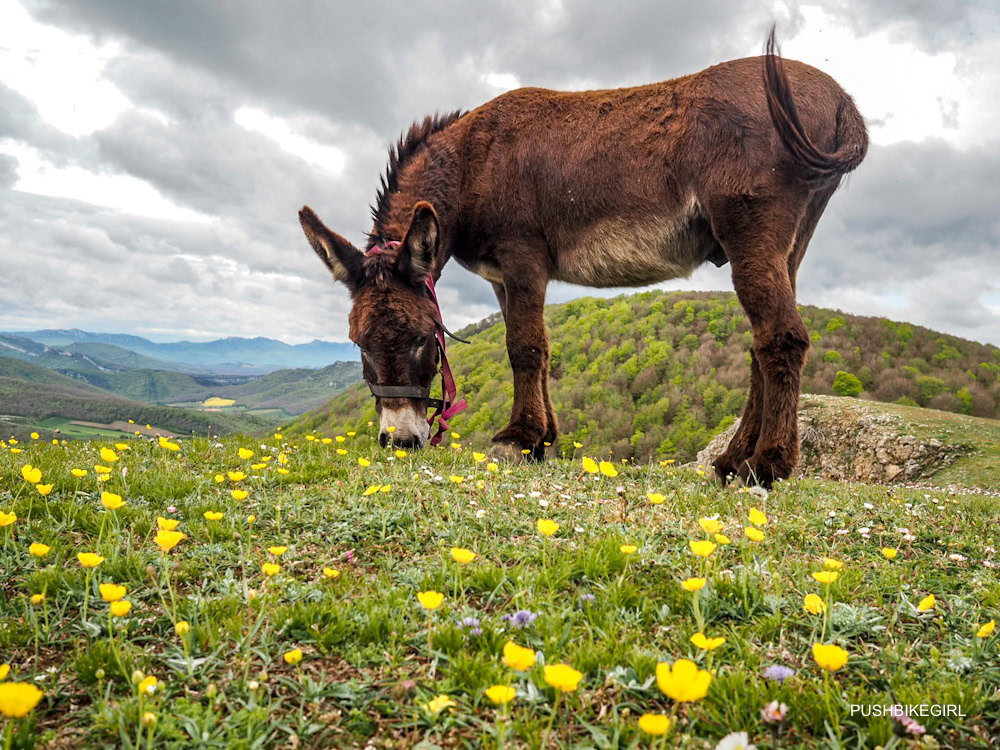
Django, who today, on the first day of this adventure, is packed with bags and carries about 20 kilos, including the saddle, is easy to lead.
He is a friendly and good-natured fellow, but he is also greedy. So I keep pulling him along so we don’t get held up at every blade of grass.
I’m still unsure what the right tactic is to make distance. We’re still working on it.
On the other hand, Momo has free run and trots along behind us, using the time to stuff as much as possible into himself.
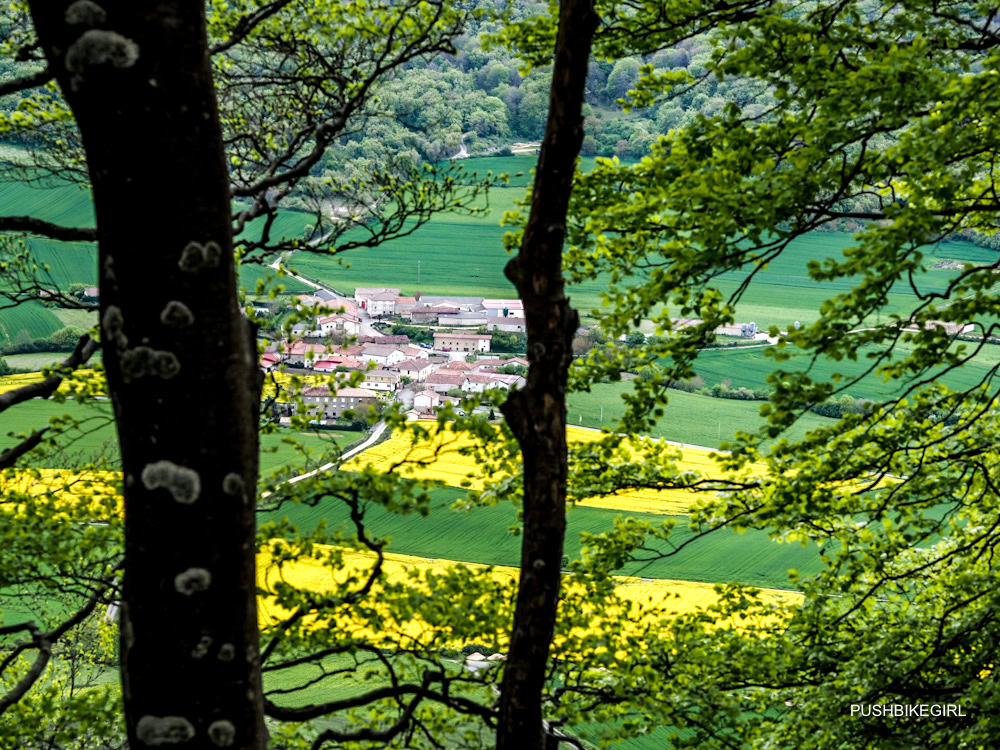
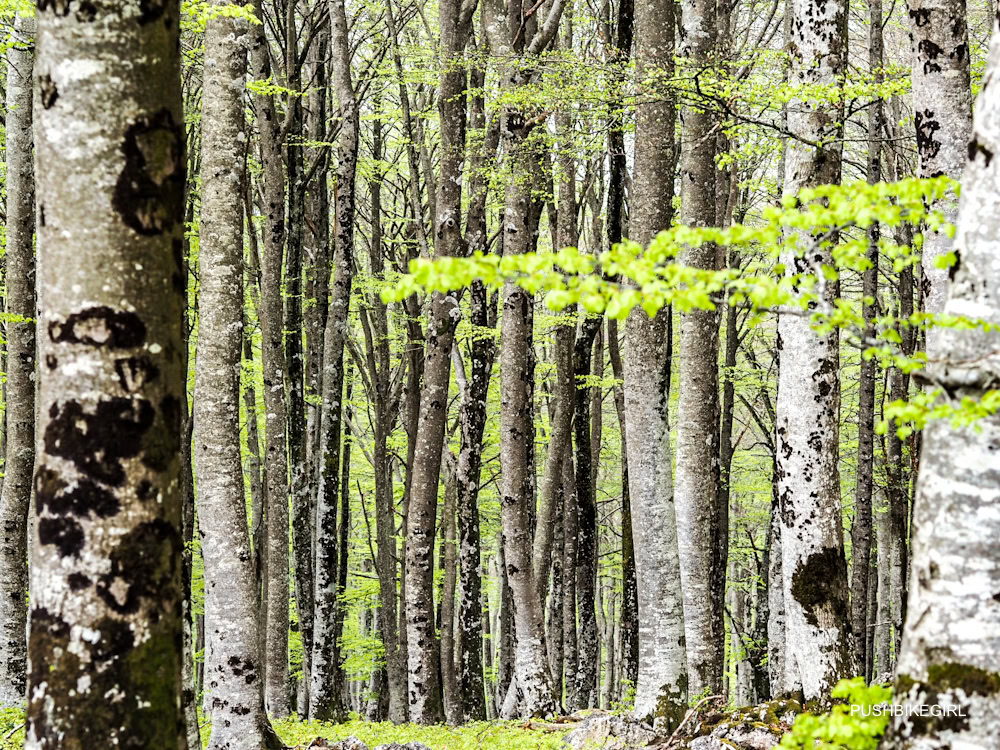
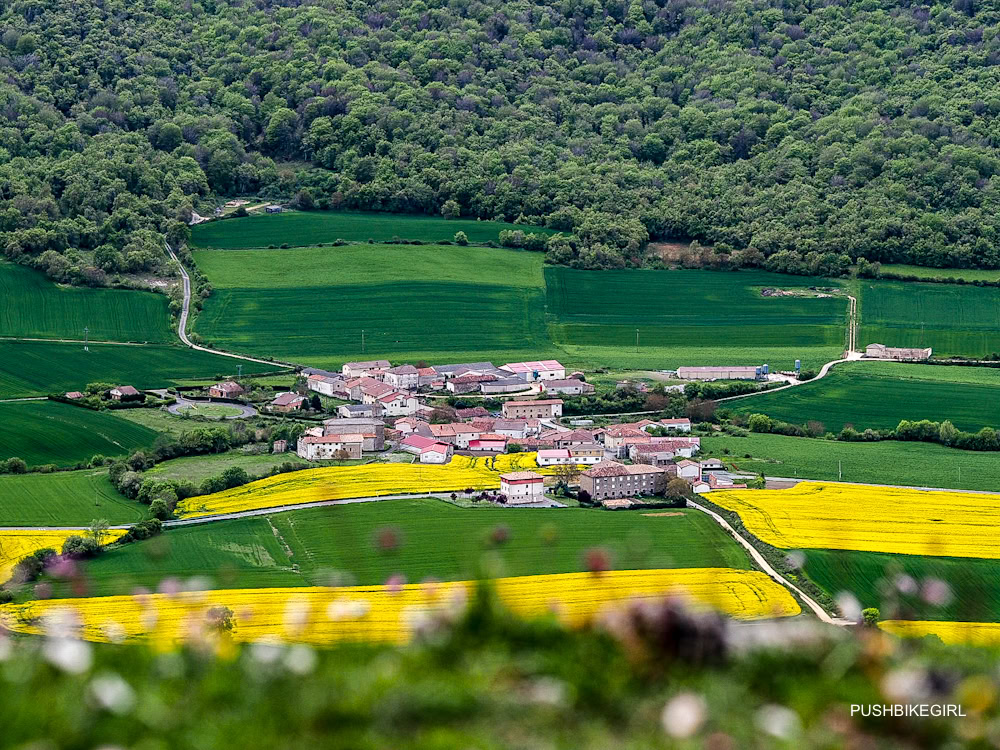
We pass through a beautiful beech forest, hike over hill and dale, and slide down the wet forest slope because the ground is super slippery.
It looks clumsy when the two heavy animals slide down the slope, but it is impressive at the same time. But somehow also worrying for a donkey trekking greenhorn like me.
In a fenced-in pasture, I tie Django to the fence for a moment, open the gate, pull them to the other side, and close the barbed wire gate behind us again.
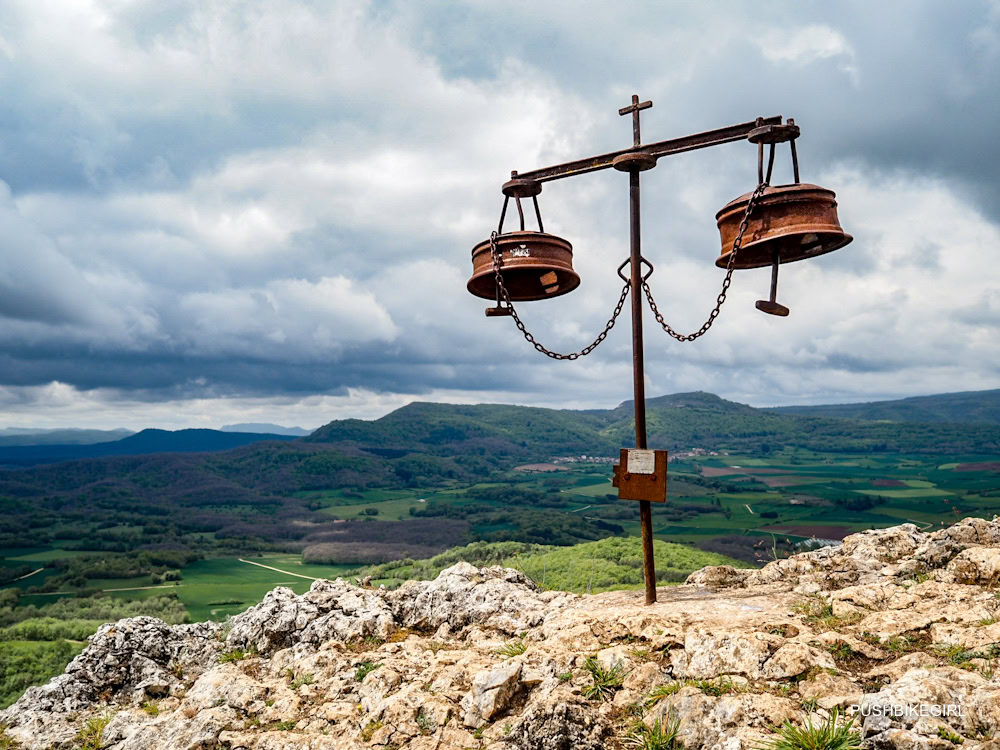
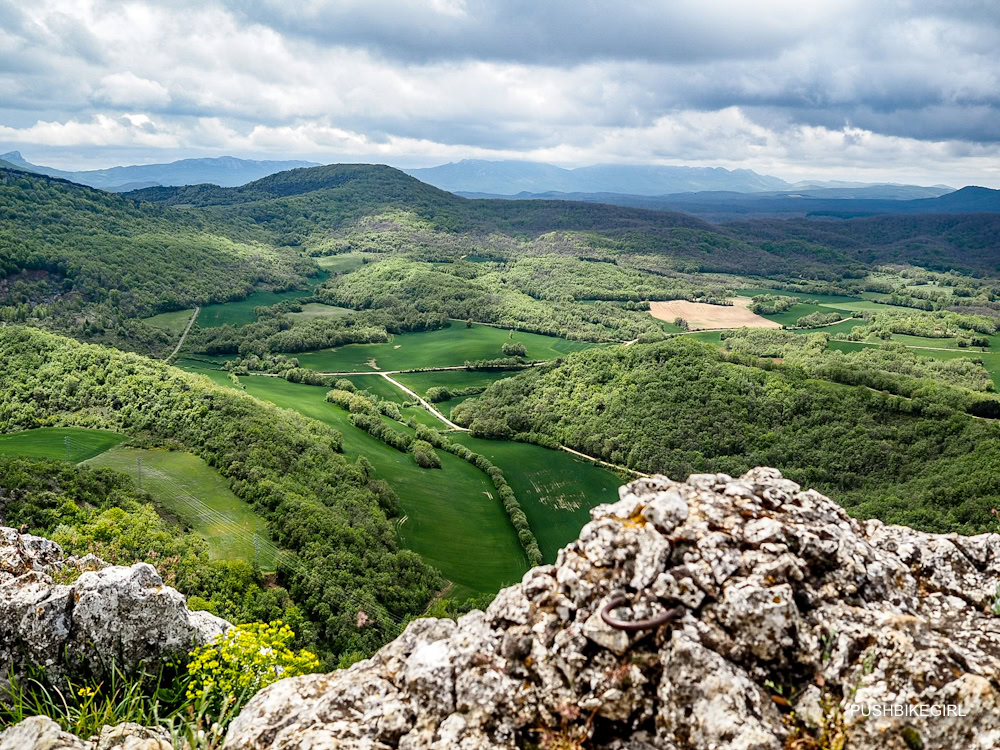

Shortly afterward, I saw the two of them smelling horse droppings, and a little later, I heard big bells ringing and saw what must have been 30 huge horses running towards us.
Butch gets nervous, and so do I, and the donkeys don’t seem to know what to do.
In other words, all four of us are unsure the closer the horses get—beautiful horses with bushy hair on their feet, big and very well-groomed.
But at some point, they are so close to us that Butch starts barking. I raise my stick in the air and shout at them not to come any closer. The donkeys are right next to us.
Slowly, we move on. Butch in the lead, as usual, then me with the rope in my hand, Django behind me on the rope, and Momo trudging behind of necessity.
But the loud ringing of the bells won’t stop, and neither will the horses’ hectic running back and forth.
I keep them at a distance by shouting. Luckily, we soon reach the next pasture fence. To my frustration, however, fifty giant cows must be behind it.
Great, that’s all I could think about. To be on the safe side, I put Butch on a lead and pulled the caravan across the next pasture.
The giant cows also approached curiously, but we bravely fought our way through the crowd.
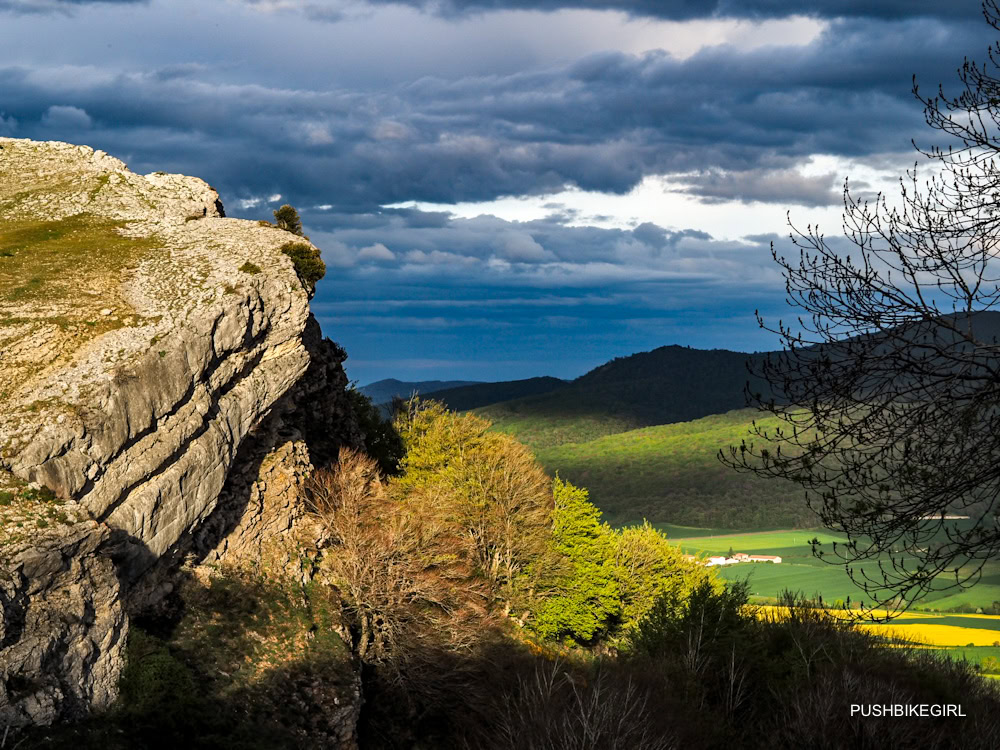
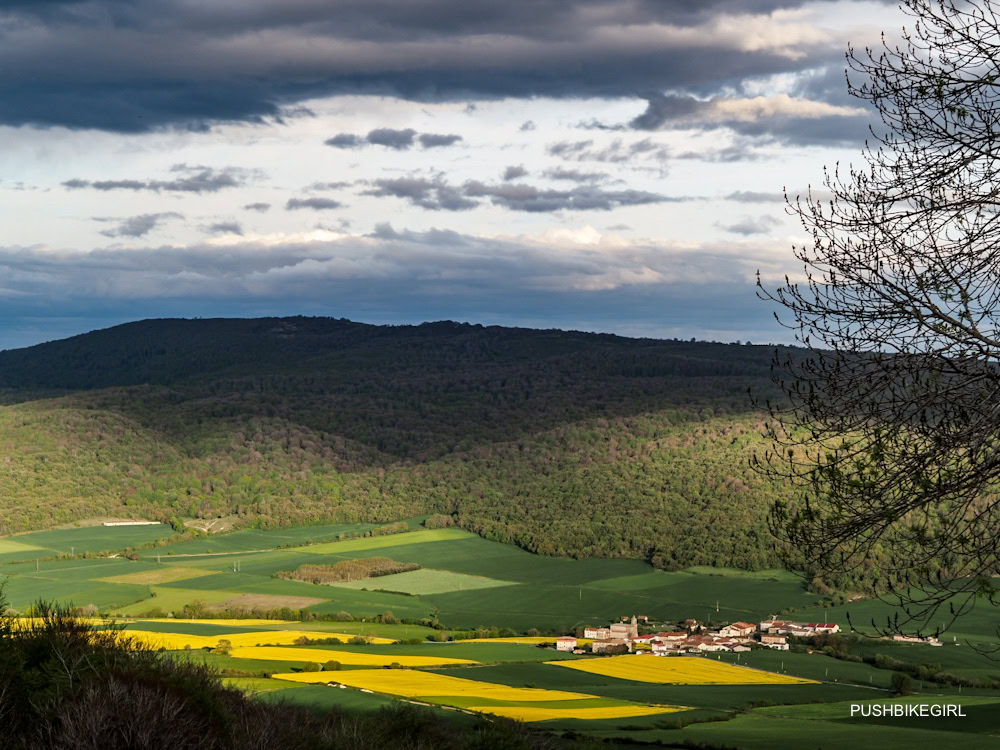
Phil had promised to visit us in the evening, I guess, he wanted to see if everything was in order and allow me to ask questions if necessary.
We agreed on a church with a great view—a dry tent site under the roof and enough grass for the donkeys to eat.
A few people come by, but nobody asks anything or has an opinion or concerns.
I stretch the original electric fence cable and connect several trees together to fence off the meadow for the donkeys.
I fetch water for everyone and finish setting up the entire camp within an hour and enjoy my cooked apple porridge while Butch enjoys some tinned sardines.
This is Spain, after all. Locals eat at 9.30 pm and go to bed after midnight.
Therefore Phil and his Scottish buddies joined us late, but I really enjoyed the visit because it was nice to be able to chat.
Phil also comments on the fence I’ve created: “10 points – all good!” which makes me happy and motivates me to keep going.
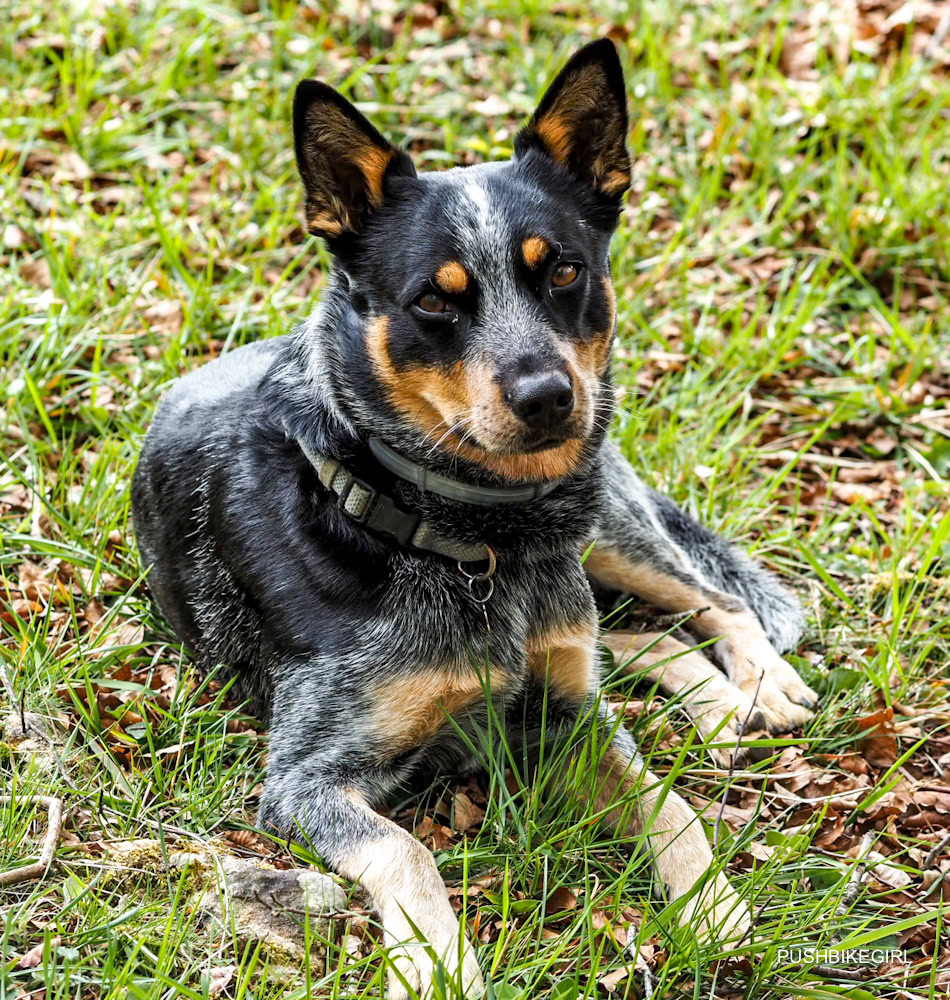
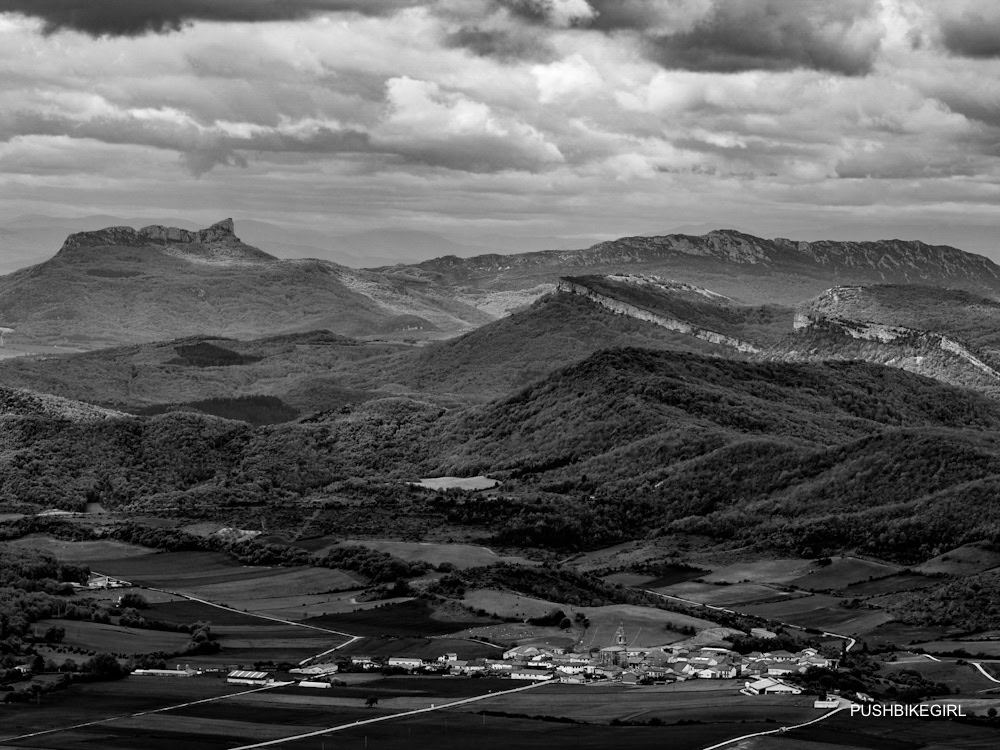
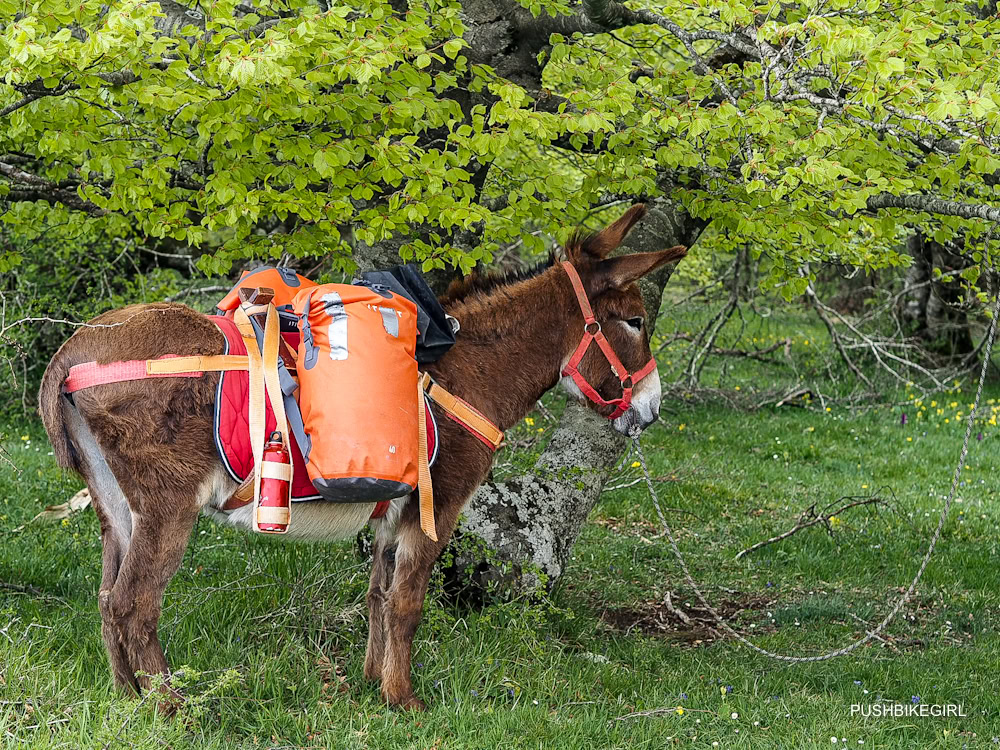
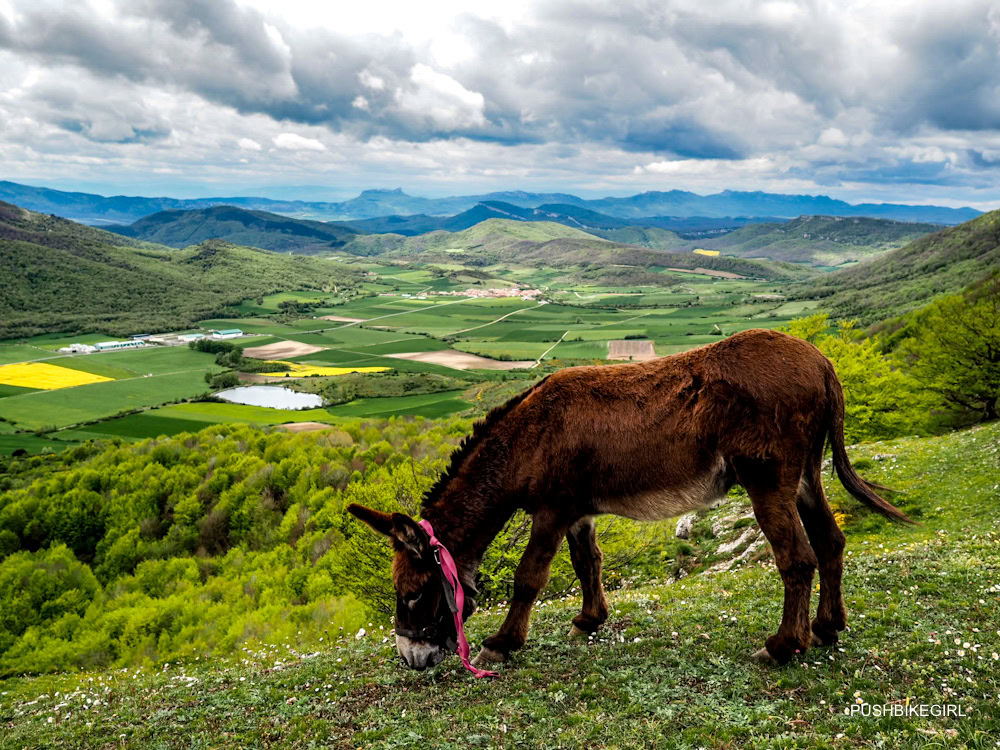
On day two, the day we end up in the little hut in the evening, I start to understand that small hurdles can become a huge problem.
Whether it’s a gate where the passage is not wide enough or cattle guards that keep the cattle from running into the next pasture.
Because, of course, the donkeys don’t like these fences either. Not to mention bridges, but I’ve already talked about that.
The landscape was sensational. Everything is super green, no wonder, with all the rain.
The views are simply fantastic. The paths are varied. From narrow and steep to broad and flat. A bit of everything. That’s how it should be.
When we come to a great viewpoint, Django stops and forgets to eat for a few minutes to take in the surroundings.
He stands there on the edge of the precipice in the sea of flowers and makes a contented impression. Like a hiker standing at the summit and saying to his buddies: “Wow, look, isn’t that great?”
So very different from Butch, who, in my opinion, has no love for views.
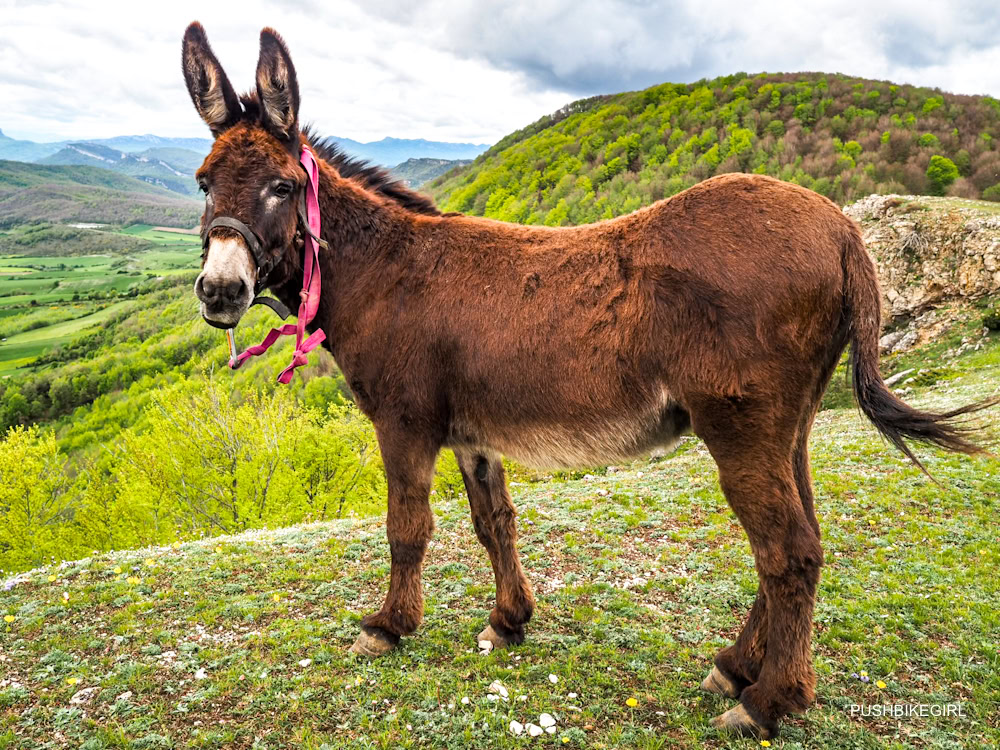
The donkeys are pleasant, calm companions, although I don’t get on so well with Momo. He gives the impression of wanting precisely the opposite of what I want.
I now realize that donkeys have their own individual characters, just like dogs or people, and that choosing the donkey you want to go on a hike with is a much more important decision than the saddle or the bags.
Because if the donkey is not up for it, then it is absolutely not up for it! Just like Momo.
That’s why day two, the day with the thunderstorm, was frustrating, whereas day one ended on a positive note with Django on the rope and in the lead.
On day three in the morning, Butch is afraid to run out of the little hut because there are eight long donkey legs in front of the hut.
The day also starts with fishing dry socks from my rucksack, but I must wear soaking wet shoes, a wet sweater, and damp trousers.
Everything is shrouded in mist. The grass is soaking wet, and visibility is less than 100 meters. I estimate the outside temperature to be 10 degrees, so it’s slightly warmer than the last few weeks.
Admittedly, I’m fed up with the rain. Especially rain with cold temperatures sucks.
Having crap weather for six weeks is simply at least five weeks too long.
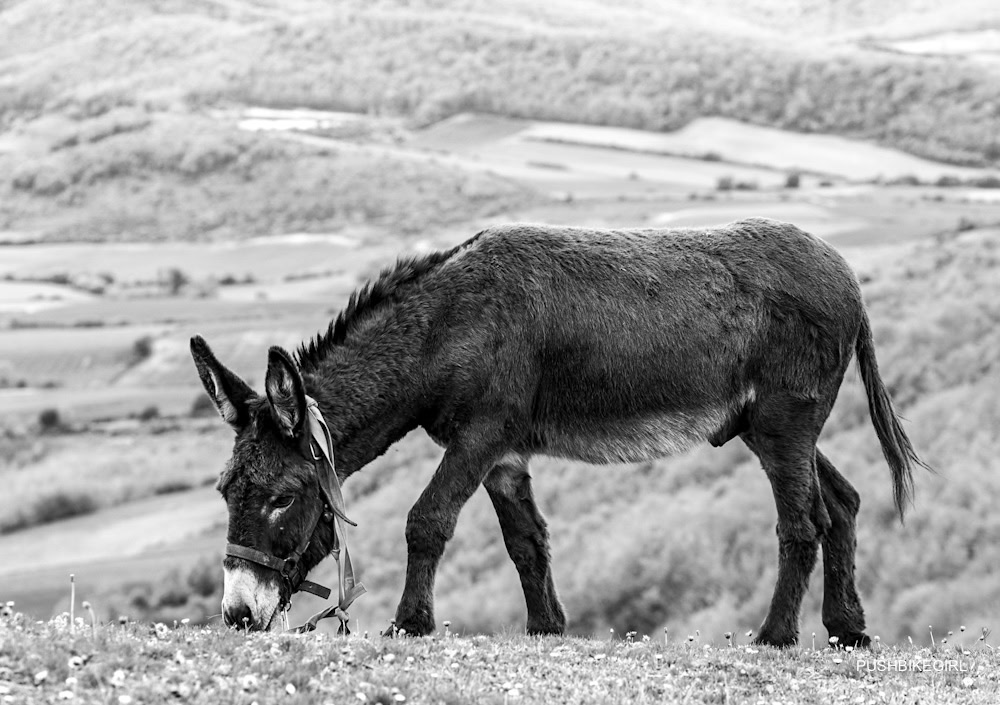
Because my monthly credit on my cell phone ran out and I unfortunately forgot to pay the monthly fee at a kiosk in time, I couldn’t keep Phil up to date the night before and was worried that he might be afraid for his donkeys.
Forcing me to walk towards a major road to stop someone and call him.
The second car to come by stops and lets me make the call.
“Yes, I wondered why you hadn’t contacted me, but I’m not worried yet,” says Phil.
Two Brazilian hikers turn up.
Wow, other hikers? Who would have thought there would be other hikers in such a beautiful hiking area? I’ve been wondering for weeks why no one ever hikes here.
Cool guys who are happy to meet us.
“Finally, someone who talks to us,” says Juan, who introduces his buddy, also called Juan.
“Yeah, people don’t talk much here,” is my reply.
“They’re not friendly either,” says one of the two Juans, so we joked a little about the Spaniards.
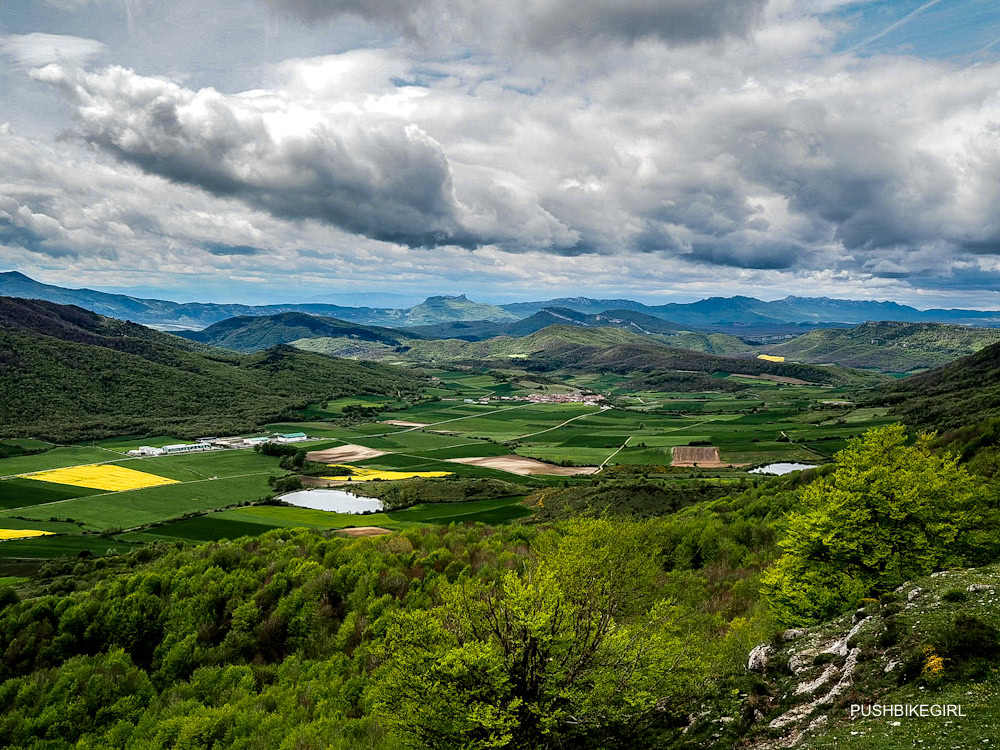
Unfortunately, I can’t find water anywhere, so we must go to the next village, 12 kilometers, which is almost a day’s journey with donkeys.
When we arrived in the village, I greeted the only three people on the street and one woman standing at her window, which she quickly closed so as not to have to greet me back.
Strange but somehow understandable, as strangers rarely come here.
So I fill the water bottles, give the animals water and we walk to the fields surrounding the village so that I can cook lunch, Butch can have his midday nap, and the donkeys can graze.
I sit in the grass in the bright sunshine and enjoy my break and the warmth.
Wow, I’m completely exhausted and would love to take a nap myself.
Unfortunately, I had to inflate my mat again every two hours during the night, and I hope I will soon have the opportunity to patch up the existing hole. A good night’s sleep is simply essential.
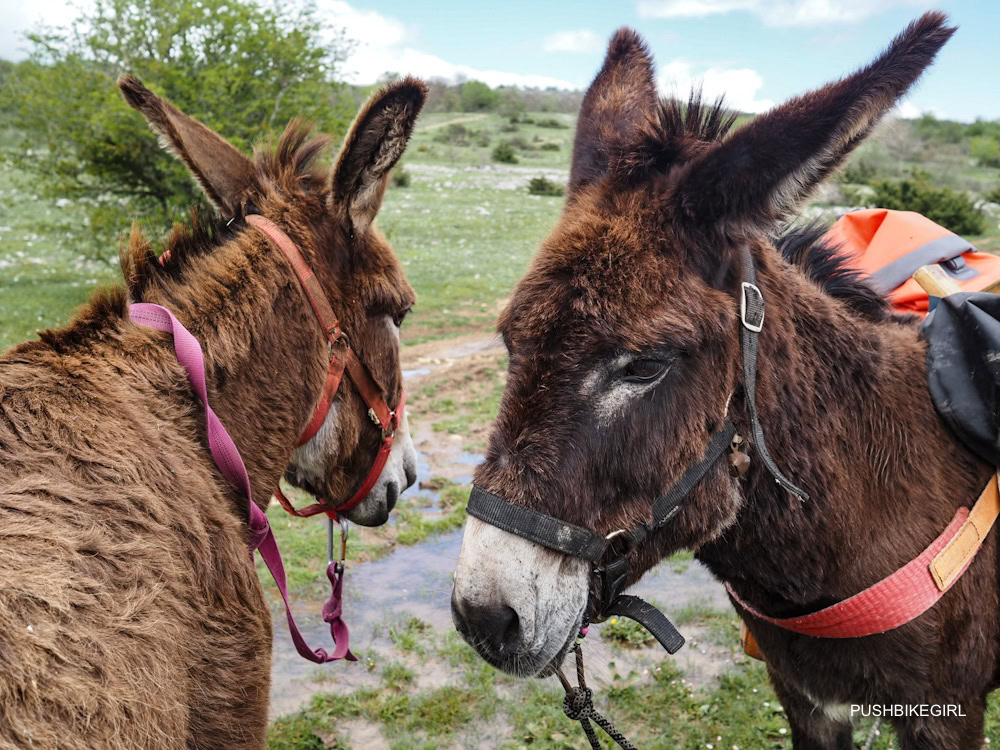
So, while I’m cooking and enjoying chopping fresh vegetables in my pot, Momo runs towards the road.
“Stop!” and I run after him to catch him again.
With Butch immediately ready to help, I grab Momo by the rope and pull him back to our place, where there are the same plants to eat as where he wants to go.
Five minutes, and he’s gone again! I follow again, and to make the chaos perfect, the food unfortunately boils over. Taking a break feels somehow different.
The third time he runs off, I tie Momo to Django but soon realize how annoying this is for him.
Our gear bags are not far from the two, and Momo kicks them. I think he’s trying to tell me: Are you crazy? I want to eat!
Django, on the other hand, seems to be enjoying the break, and Butch is also enjoying his sleep.
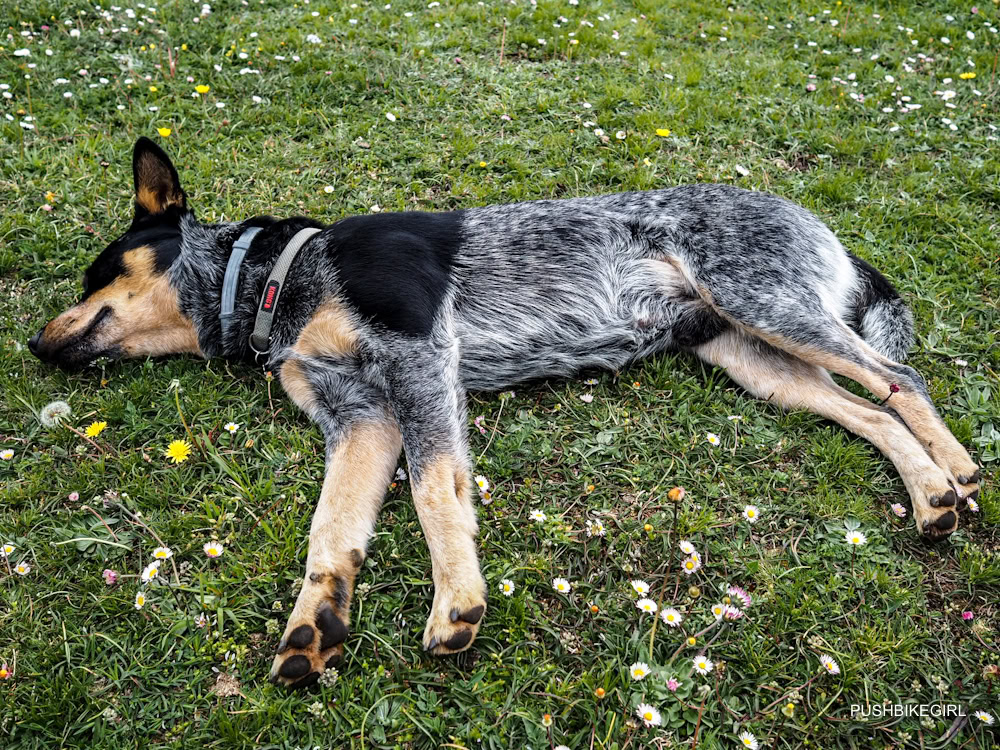
As I try to eat my lunch, I naturally wonder whether this is my long-term goal. Can I even assess it after such a short time?
What are the pros and cons of traveling with so many animals?
Where can I even go with them? Border formalities, distances, etc. But also banal things like wanting to sleep in a bed or take a shower?
As I know, there is always a solution for almost everything, but the question is whether the price is too high in the end.
What if I fall in love with the animals? Can I give them back at the end of the long journey and find a new home for them with a clear conscience?
Two donkeys are supposedly better because they are herd animals, but is it too much work in the end to be on the road with two more animals?
How many shitstorms will I get online because people think I’m mistreating the animals by loading them up with too much baggage in their eyes?
Why have I been dreaming of traveling with pack animals for so long?
I am looking for answers. Observe and question.
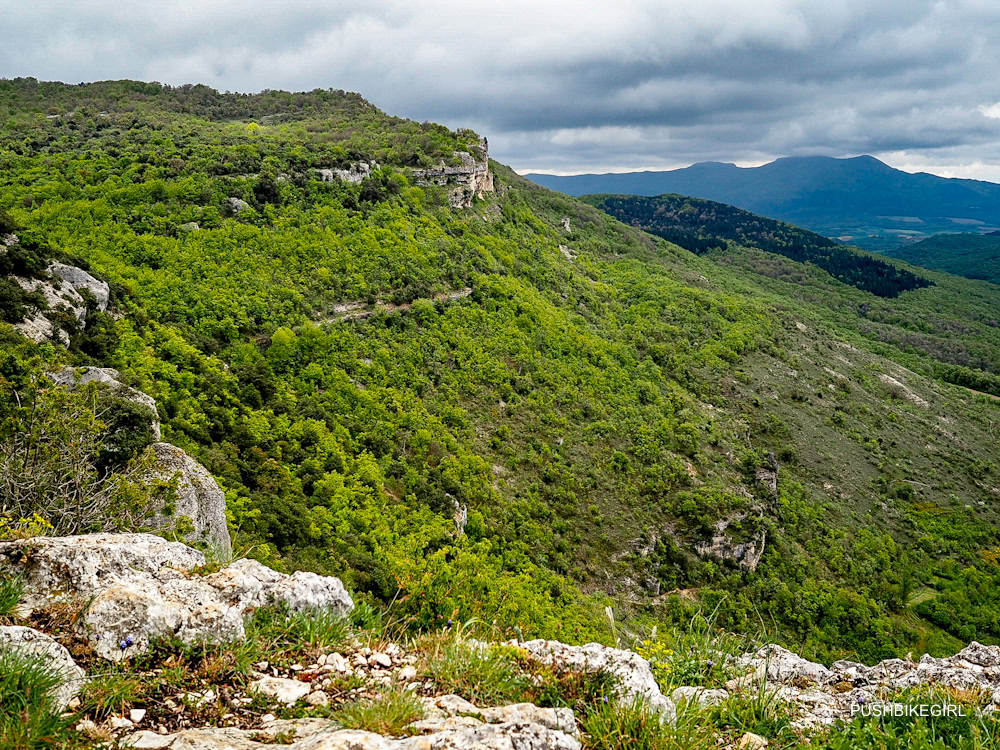
Wandering gently, quietly, and slowly through the world and being self-sufficient would undoubtedly be great. I am interrupted from daydreaming by a mountain biker who greets me in a friendly manner, and I wave back happily.
So, I’m torn about whether this is something for me in the long term. I’m afraid of the responsibility, but I had the same fear with Butch.
We arrive in Sabando in the evening—a tiny place, like all the places here.
I have specially chosen a path to end up in a village at the end of the day and to see how easy or difficult it is to fence in an area there and also to be able to pitch a tent nearby. After all, this test hike should also show how realistic such a hike is in the long run, because, at some point, I will be confronted with civilization again. Hiking only in the forest is not possible in the long term.
As always, the forecourt of the village church provides a dry place for the tent, and I use a stop sign right opposite to connect the barrier tape with a boundary fence to the playground next to the main road.
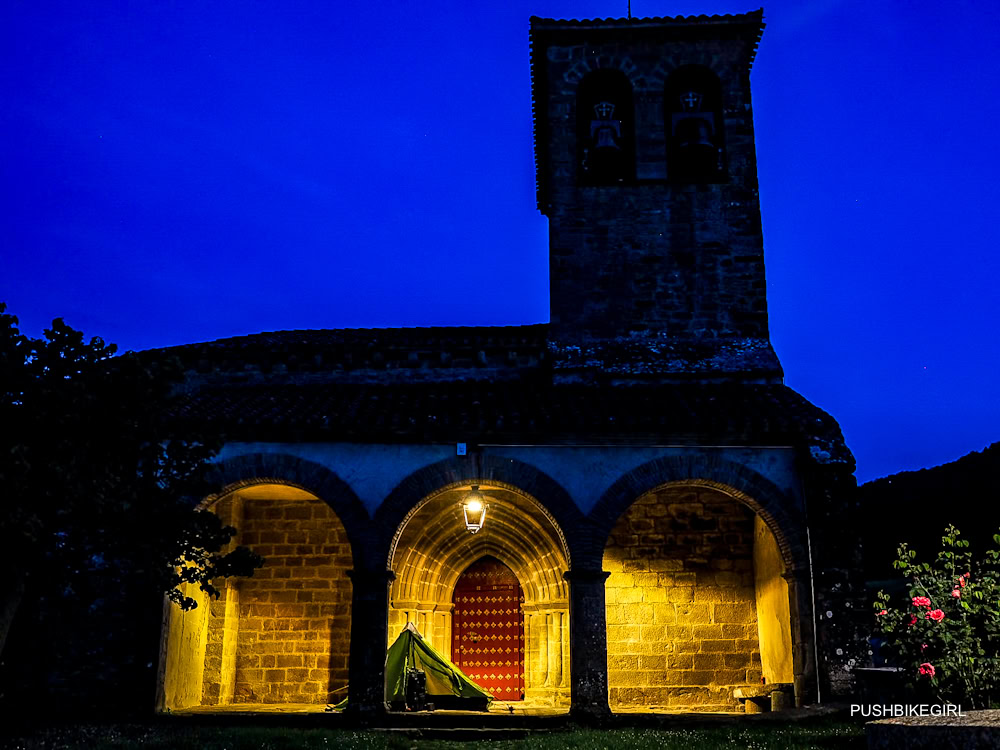
The local dogs celebrate our arrival, and the barking never stops.
Butch is now familiar with every dog and is soon lying dog-tired in the tent when a man comes up to us.
“How long do you want to stay? Where are you from? We use the grass as alfalfa, but the donkeys don’t eat much in one night, so that you can stay. Are these Phil’s donkeys?”
Hooray, someone is interested in us – a reason to have a friendly chat and answer all questions.
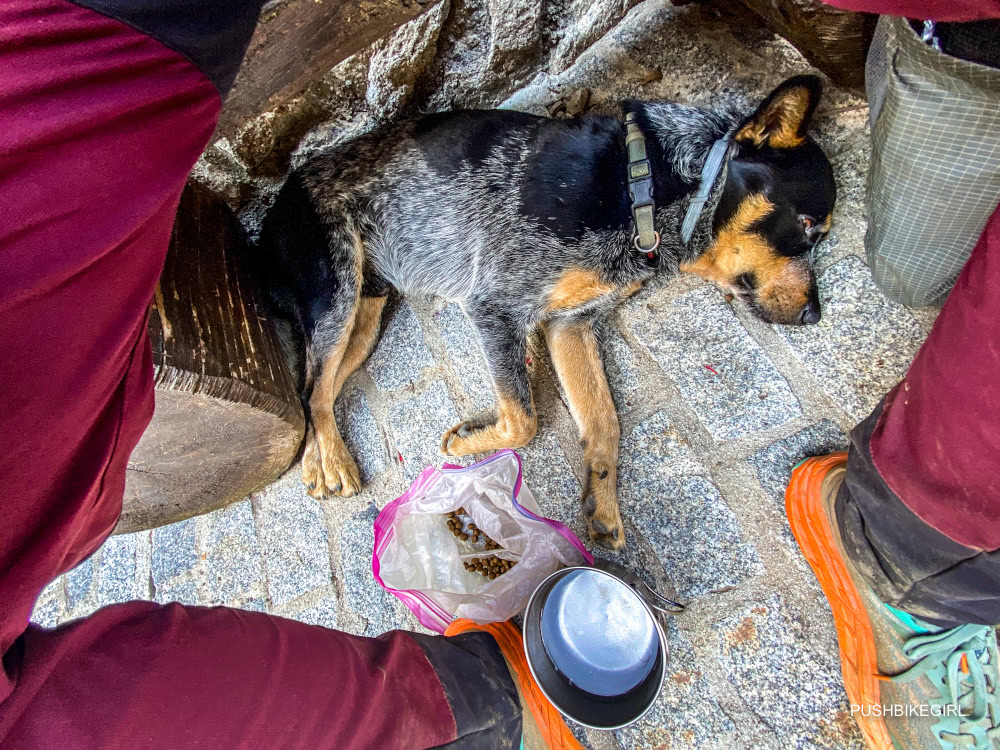
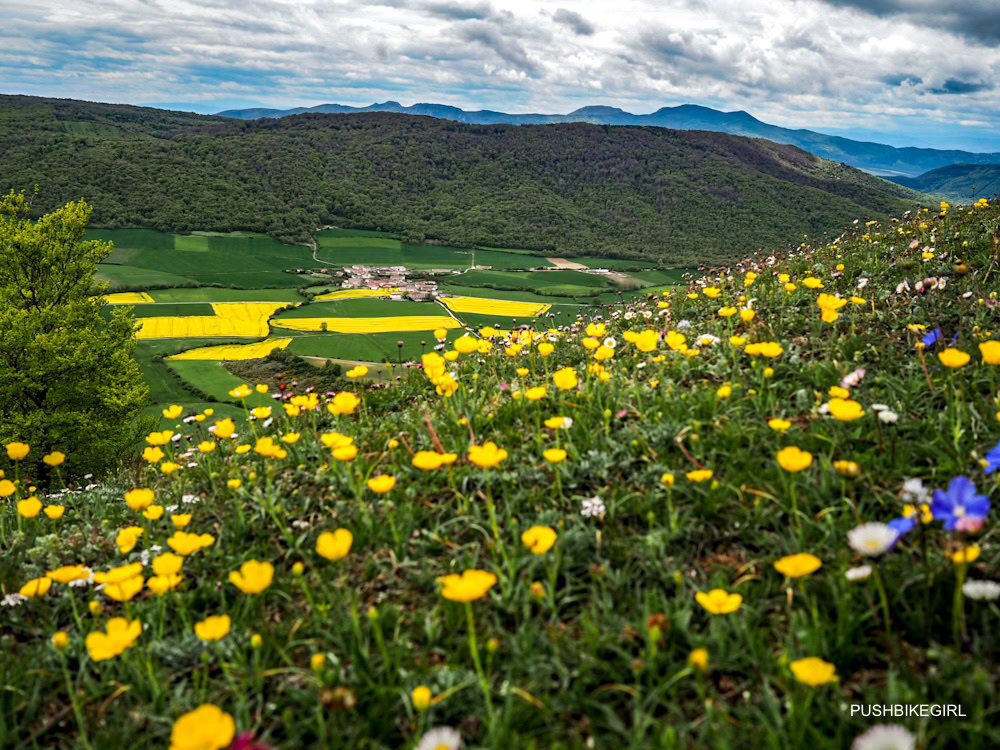
On the fourth day, it rains again for a change, and I make a huge rookie mistake.
I’m already feeling uneasy in the morning because I know it’s Momo’s turn to carry the luggage again today and I assume there will be trouble again.
I choose a route that takes us close to their home, and unfortunately, this is the start of another problematic day.
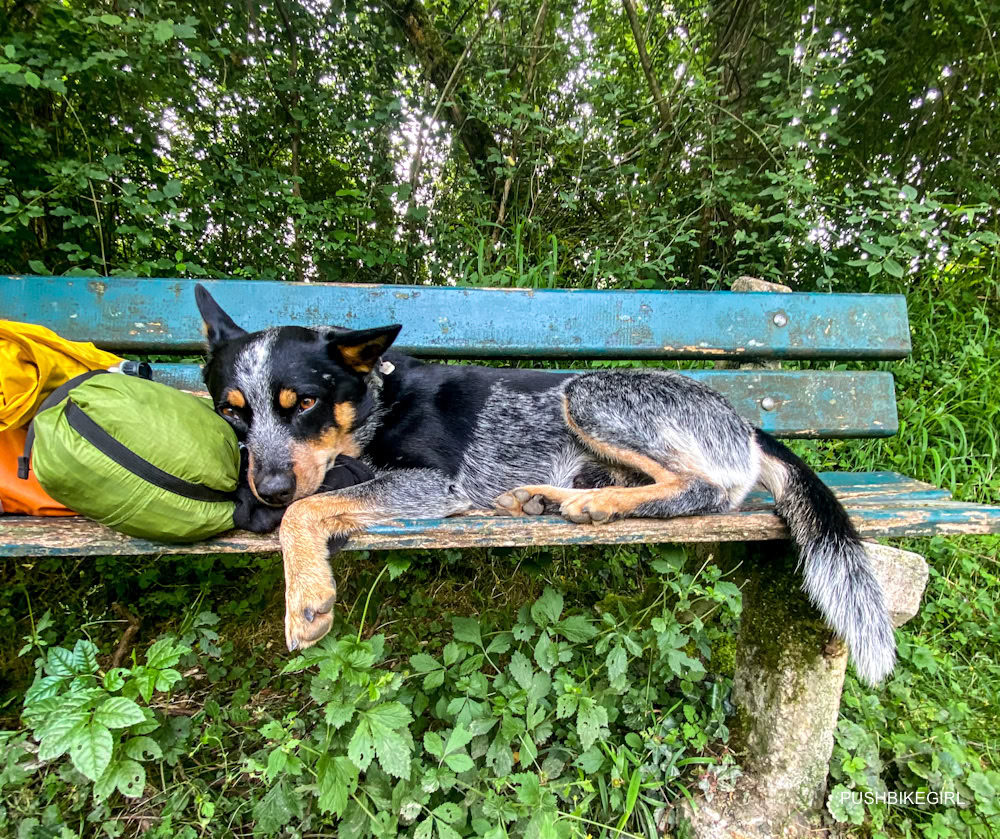
Once we reach the top of a plateau, I take my baguette out of my rucksack, which I bought from a baker on wheels in the village, and start eating breakfast while Momo keeps pushing me and urging me to give him more of it than I already do.
The air between the two of us is uncomfortable, while Django, as always, follows easily and promptly.
At a tight spot, the thing I was dreading the most happened.
Momo decides to run off. I try to hold him on the rope, but I can’t withstand his strength, and before I possibly hurt myself, I let go, and he runs away and Django with him.
Leaving Butch and I standing there, looking through the dense forest, wondering which of the many possible paths they may have taken. I have no idea in which direction they might have run.
I can’t call Phil and ask him for tips on how best to find them again, because my phone isn’t working.
So, what’s the correct tactic for catching two donkeys again?
Butch and I set off. It feels like we walk along every little path, but there’s no sign of the donkeys.
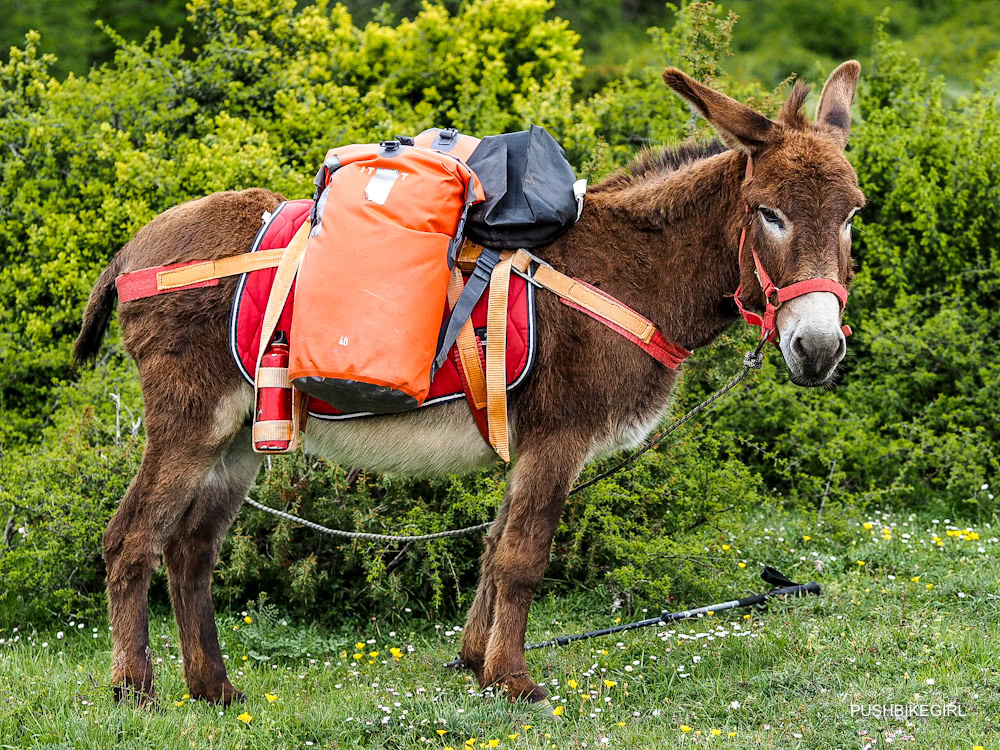
I decide to continue in the direction of their home, and that’s exactly where I will find them again. After about two long hours, I see the orange bags glowing in the distance.
Phew, well done again, and we carefully approach the two.
They walk on with us without hesitation. At some point, it’s a steep descent down the mountain, and suddenly we’re standing in front of a rock step that’s at least a meter high, and I’m just like: “Shit, do we have to backtrack,” but Momo simply jumps down the step with all four legs at the same time and goes full throttle.
He keeps overtaking me on the descent, and his pace makes me uncomfortable. He pushes me to one side, jostles, and bangs on.
I keep trying to stop him and calm him down, but Momo only has one goal: home.
I want to turn left at a crossroads, but Momo only goes right.
So after a while, I bend to the will of the stronger one, and we jog almost the last few kilometers until the two of them stop 200 meters from Phil’s house and don’t want to go forward or backward.
They stand there; no matter how I pull them, they don’t budge.
The lead is long enough to tie them to a railing, so I can run to the house, hoping that Phil’s daughter is there and can help because Phil is on a climbing vacation.
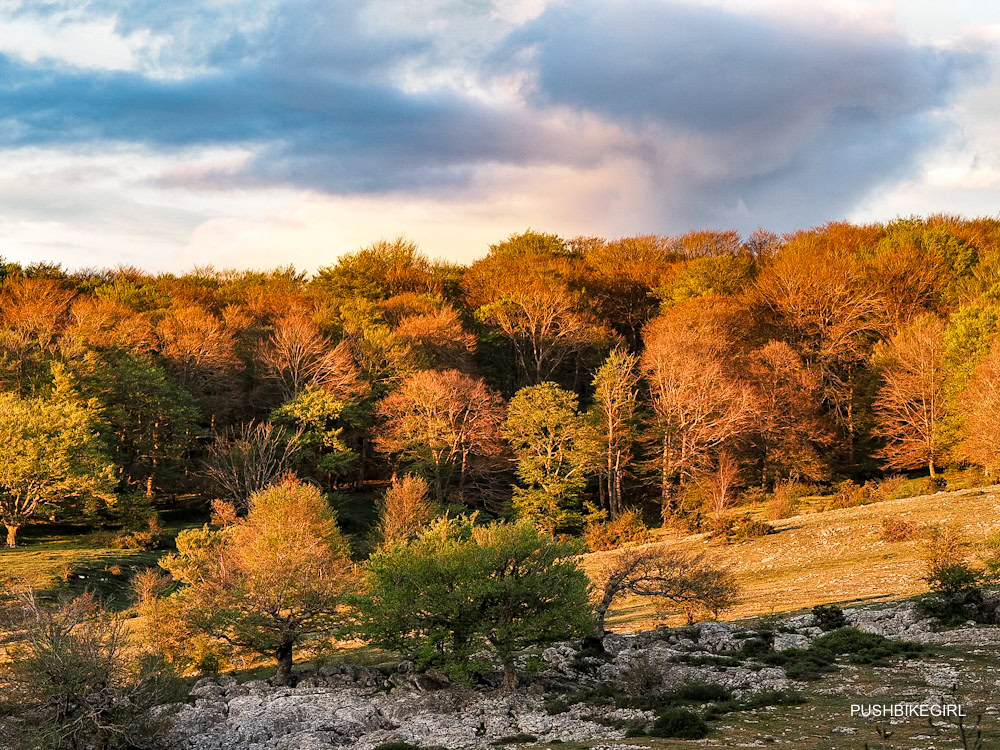
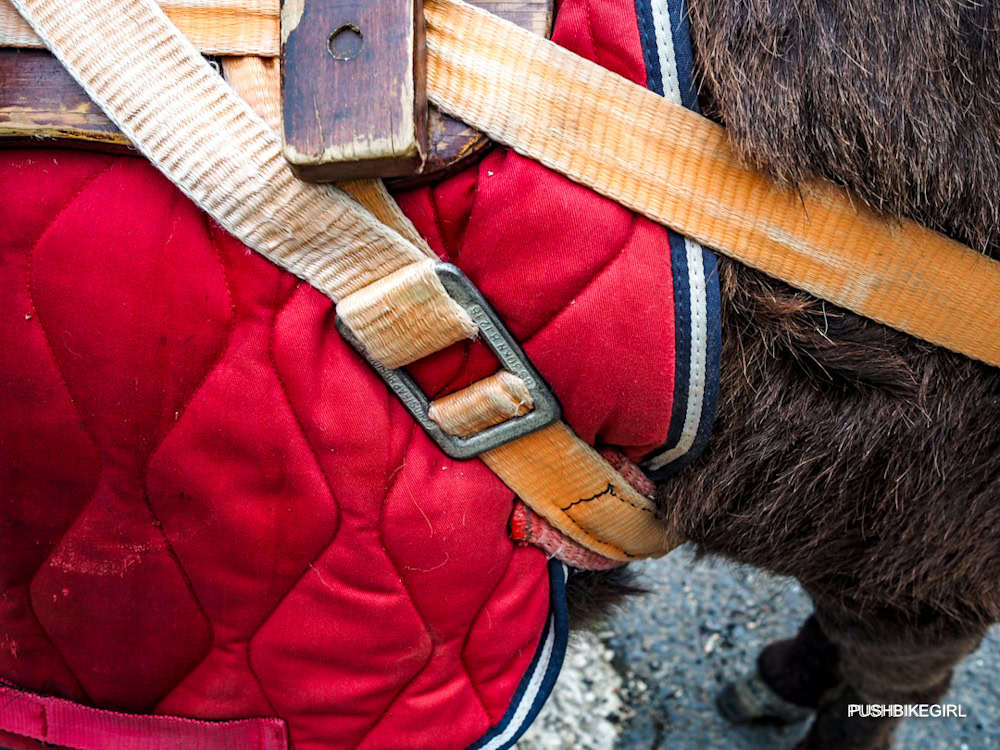
At first, she tries it alone but doesn’t get any further than I did, but together, we manage to outwit the stubborn Momo and drive the two of them together to their two buddies that we left behind four days ago.
All’s well that ends well?
Butch and I walk into the village, hoping to recharge my SIM card. On our return, we pass where the donkeys should have been, but they have already broken jail.

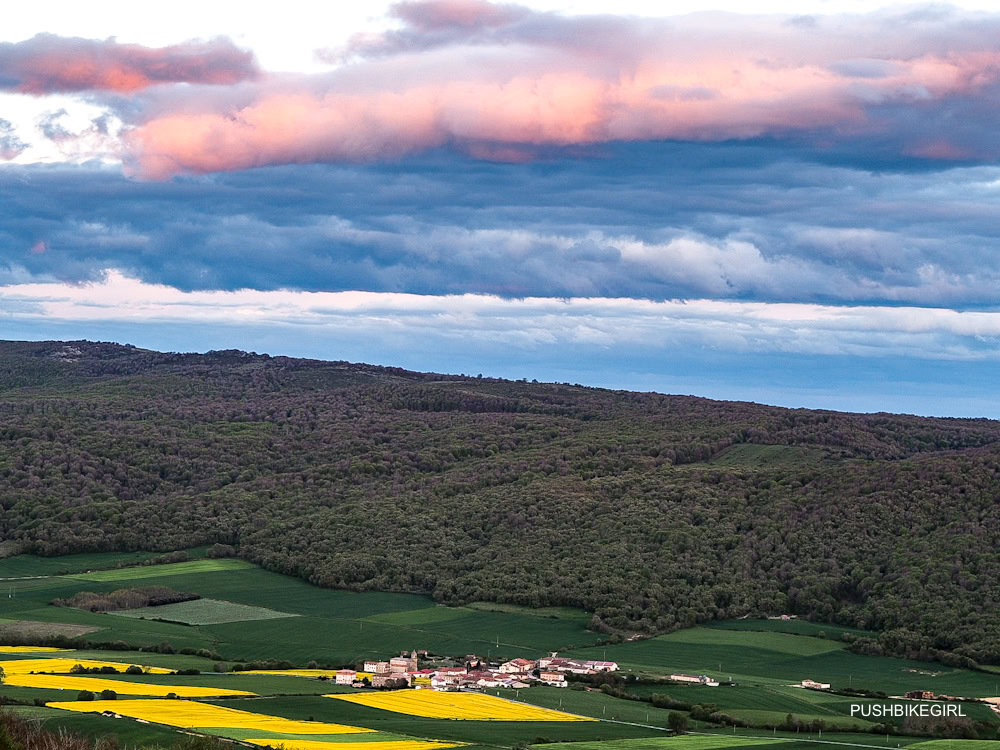
Not far away, I see Ishai Phil’s daughter trying in vain to catch the donkeys again.
“Momo, that fucker,” I hear her grumble.
We bring them back together, and one of the neighbors builds a sturdy gate that evening so they can’t escape again.
Instead of five days, we only end up hiking for four. But that doesn’t matter.
It was a nerve-wracking, extraordinary adventure. A real adventure!
As I stand in the shower and enjoy the hot water, I ask myself: Are you seriously going to do this every day?
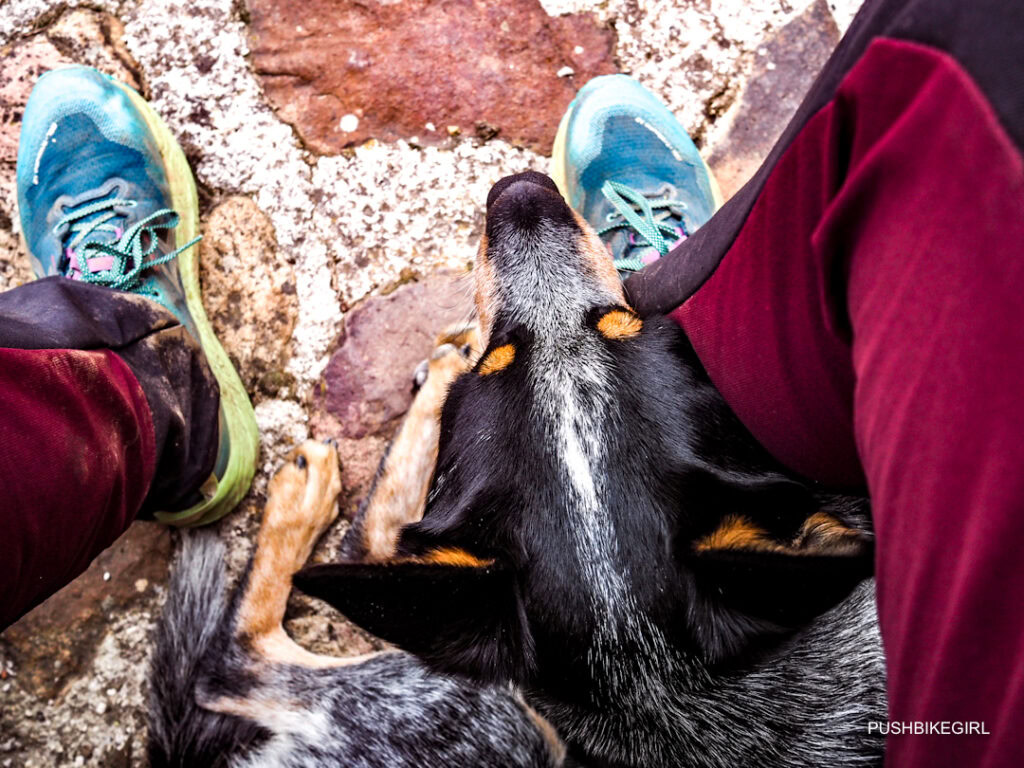
Tip Jar
Butch and I make a living from this blog.
If you find our adventures entertaining, we’d be delighted with a little treat from you.
Thank you so much!
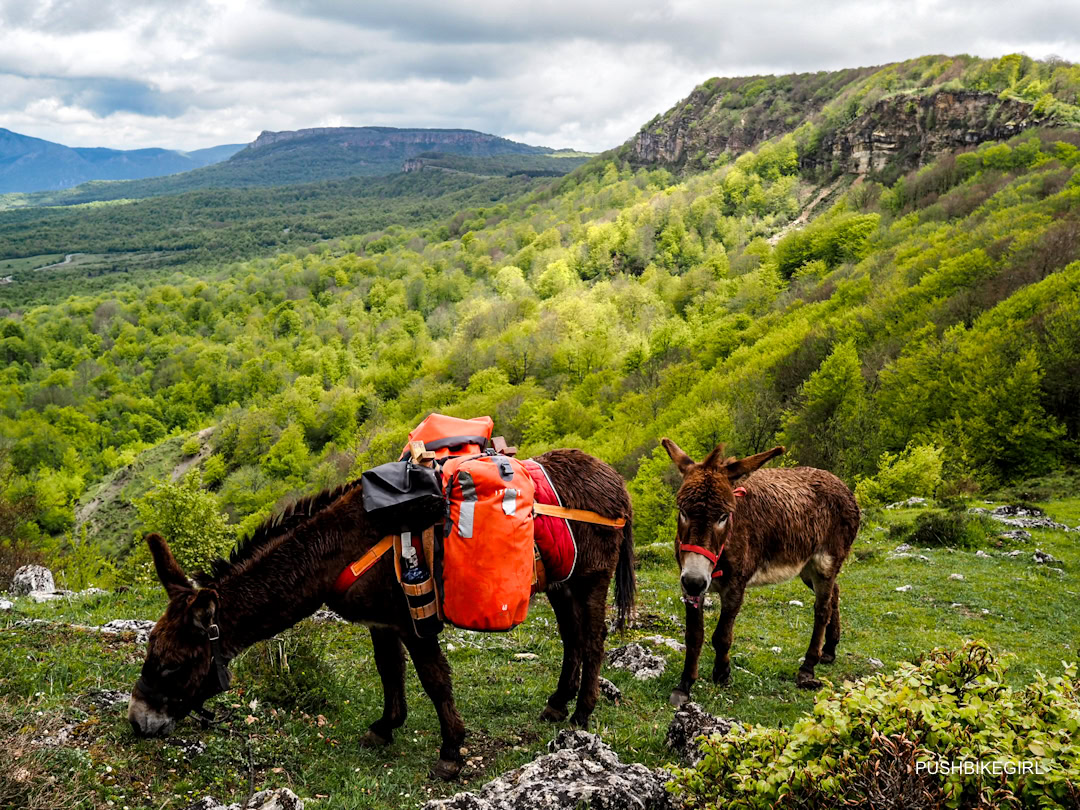
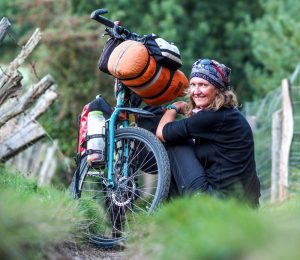


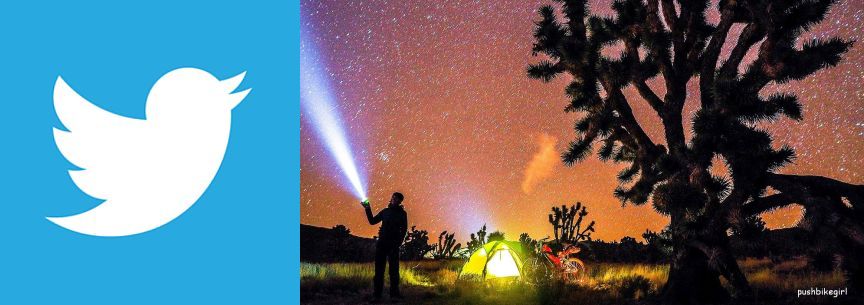

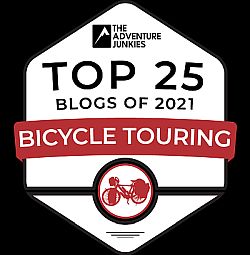
Heike, once again an entertaining read, and visual treat. I remember your dream of hiking with a pack animal, I’m glad you finally were able to give it a try with Momo and Django. Loved the photos of them. I’m guessing Butch wasn’t sad when you left them behind.
Wishing you the best, and as always thanks for taking us along.
Cheers
Thanks mate for all your great compliments!
Yes you are right – Butch wasn’t sad when we left 😍
Happy New Year!
Best greetings Heike + Butch
Wonderful read—thanks for letting us see what it means to test your limits! What an adventure.
Thank you Catherine- what a great compliment!!!
Wishing you well !
Hugs from us
Fabulous photos as usual. It sounds like you had one donkey too many. That Momo is a piece of work. Do you still want to do more with pack animals? Carry on and be safe. Happy New Year!
Thank you Burt!
Yeah, might have been one too much….
After all..this is not for me! Way too complicated.
But fun nonetheless.
One animal ( Butch) is enough.
Best greetings
Heike ,as always i look forward to reading your wonderful adventures
Zena our blue heeler in Perth Western Australia says hi to Butch
Phil (not the donkey man hahahhahahahahaha)
Hi Phil (not the Scott 😃) thats great to hear – thank you!
Say hi back to Zena……best greetings from Butch
I’m sure it wasn’t funny at the time, but your telling of the story was hilarious! I know how you’ve been wanting to hike with a donkey for a long time! Maybe pack goats would work better???
Hi Colleen,
thanks Colleen !!! Yup, it had its charme but way too difficult…one animal is plenty enough and Butch has my heart.
Sometimes I am dreaming of the good old times when I had my bicycle 🚴 and who knows I might get one again. Butch is matured and not as crazy as he used to be when you met him.
But the hiking takes you to places where a bike can’t go……and I love the hiking 🥾
Hope the New Year will bring you great adventures….
Hugs from both of us – missing the US every single day.
Happy trails to WA.
Heike and Butch
Hello nice story, thanks.
from what I heard when I was cycling the pioneers trails in Australia, it sounds the right place to travel with animals, horses or camels, always going by 2, it’s necessary. first there are 20.000 km trails with guide books and shelters for that. and local people enjoy the dream. I heard a few times from a farmer the story of a long distance traveler with animals. also it’s part of the local history and legend, first native nomads, then explorers, then pioneers, and then unemployed wandering by groups, and finally every australian dream. the revenge of the native nomads.
I started to follow these tracks, but with a loaded bicycle it was generally too hard, so I mostly follow them by back roads. a great time, reading the history of those who opened the way.
Hi, thanks
I am sure crossing Australia with Camels would be a sensational experience but it’s a long way …….
I crossed Australia on a pushbike as well and love the country very much but it can be pretty dull at times seeing the same scenery for months ….
Best greetings ….
Yet another very enjoyable read, thank you so much. Much love and safe travels to you and Butch whichever path you find yourselves on. I am looking forward to the next installment of ‘Two feet & four paws forward’